Tourism Trends and Impacts
VerifiedAdded on 2020/01/28
|23
|4283
|225
Literature Review
AI Summary
This assignment delves into the evolving landscape of tourism, examining various trends and their consequences. It analyzes factors influencing tourism patterns, such as economic fluctuations (Brexit, US political climate), policy shifts (new visitor visas for Chinese tourists), and sustainability concerns (carbon emissions). The text also explores industry responses to these trends through company initiatives like TUI's product development and Thomson's travel predictions.
Contribute Materials
Your contribution can guide someone’s learning journey. Share your
documents today.
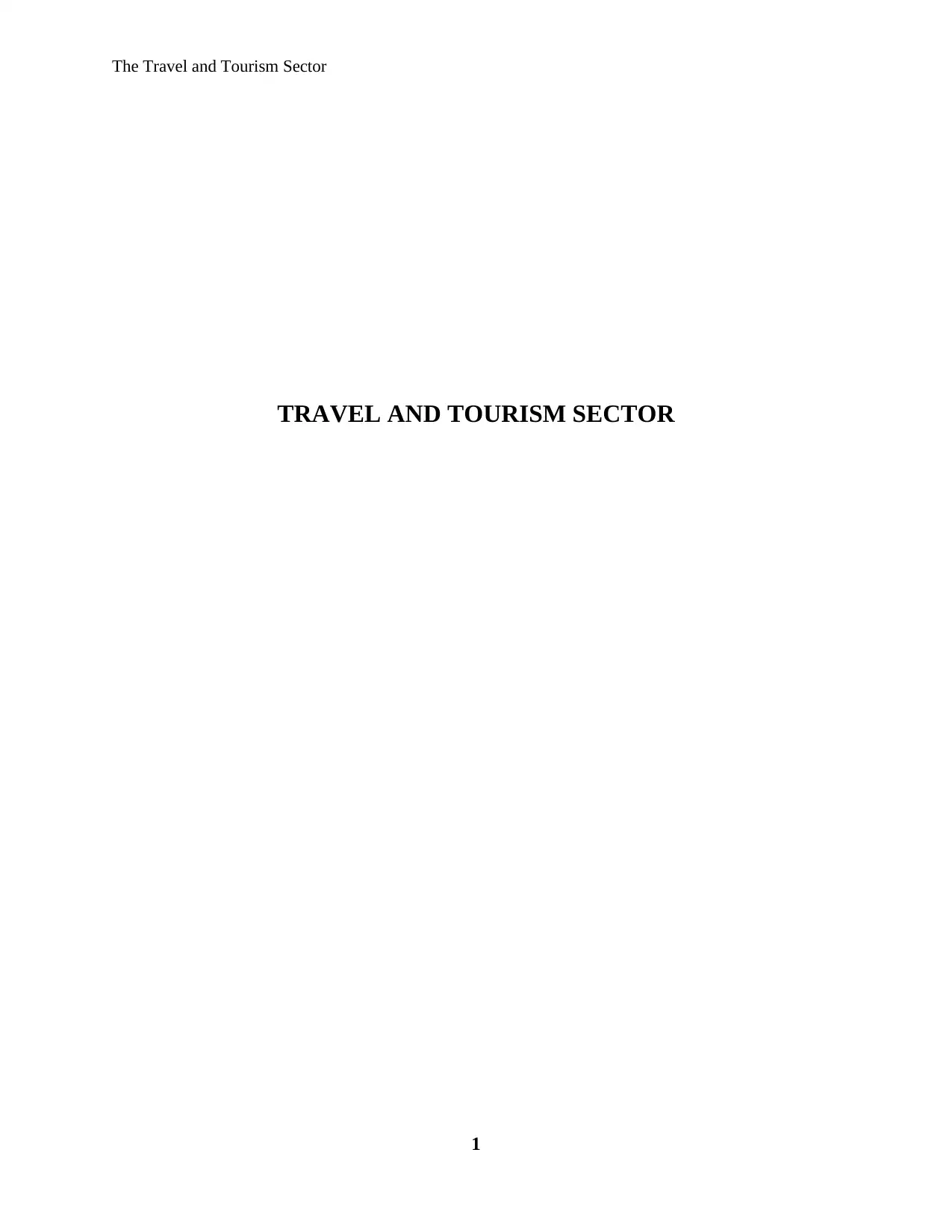
The Travel and Tourism Sector
TRAVEL AND TOURISM SECTOR
1
TRAVEL AND TOURISM SECTOR
1
Secure Best Marks with AI Grader
Need help grading? Try our AI Grader for instant feedback on your assignments.
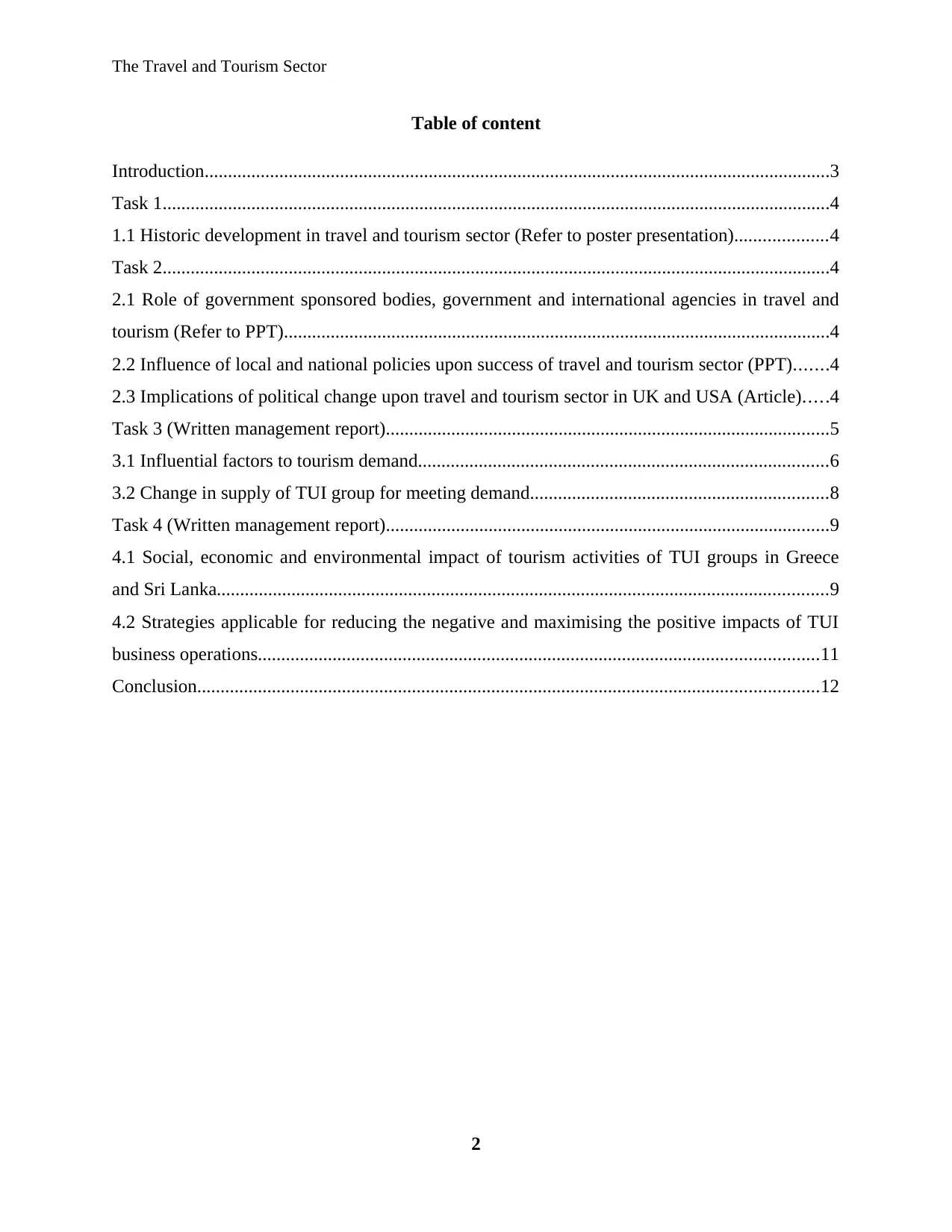
The Travel and Tourism Sector
Table of content
Introduction......................................................................................................................................3
Task 1...............................................................................................................................................4
1.1 Historic development in travel and tourism sector (Refer to poster presentation)....................4
Task 2...............................................................................................................................................4
2.1 Role of government sponsored bodies, government and international agencies in travel and
tourism (Refer to PPT).....................................................................................................................4
2.2 Influence of local and national policies upon success of travel and tourism sector (PPT).......4
2.3 Implications of political change upon travel and tourism sector in UK and USA (Article).....4
Task 3 (Written management report)...............................................................................................5
3.1 Influential factors to tourism demand........................................................................................6
3.2 Change in supply of TUI group for meeting demand................................................................8
Task 4 (Written management report)...............................................................................................9
4.1 Social, economic and environmental impact of tourism activities of TUI groups in Greece
and Sri Lanka...................................................................................................................................9
4.2 Strategies applicable for reducing the negative and maximising the positive impacts of TUI
business operations........................................................................................................................11
Conclusion.....................................................................................................................................12
2
Table of content
Introduction......................................................................................................................................3
Task 1...............................................................................................................................................4
1.1 Historic development in travel and tourism sector (Refer to poster presentation)....................4
Task 2...............................................................................................................................................4
2.1 Role of government sponsored bodies, government and international agencies in travel and
tourism (Refer to PPT).....................................................................................................................4
2.2 Influence of local and national policies upon success of travel and tourism sector (PPT).......4
2.3 Implications of political change upon travel and tourism sector in UK and USA (Article).....4
Task 3 (Written management report)...............................................................................................5
3.1 Influential factors to tourism demand........................................................................................6
3.2 Change in supply of TUI group for meeting demand................................................................8
Task 4 (Written management report)...............................................................................................9
4.1 Social, economic and environmental impact of tourism activities of TUI groups in Greece
and Sri Lanka...................................................................................................................................9
4.2 Strategies applicable for reducing the negative and maximising the positive impacts of TUI
business operations........................................................................................................................11
Conclusion.....................................................................................................................................12
2
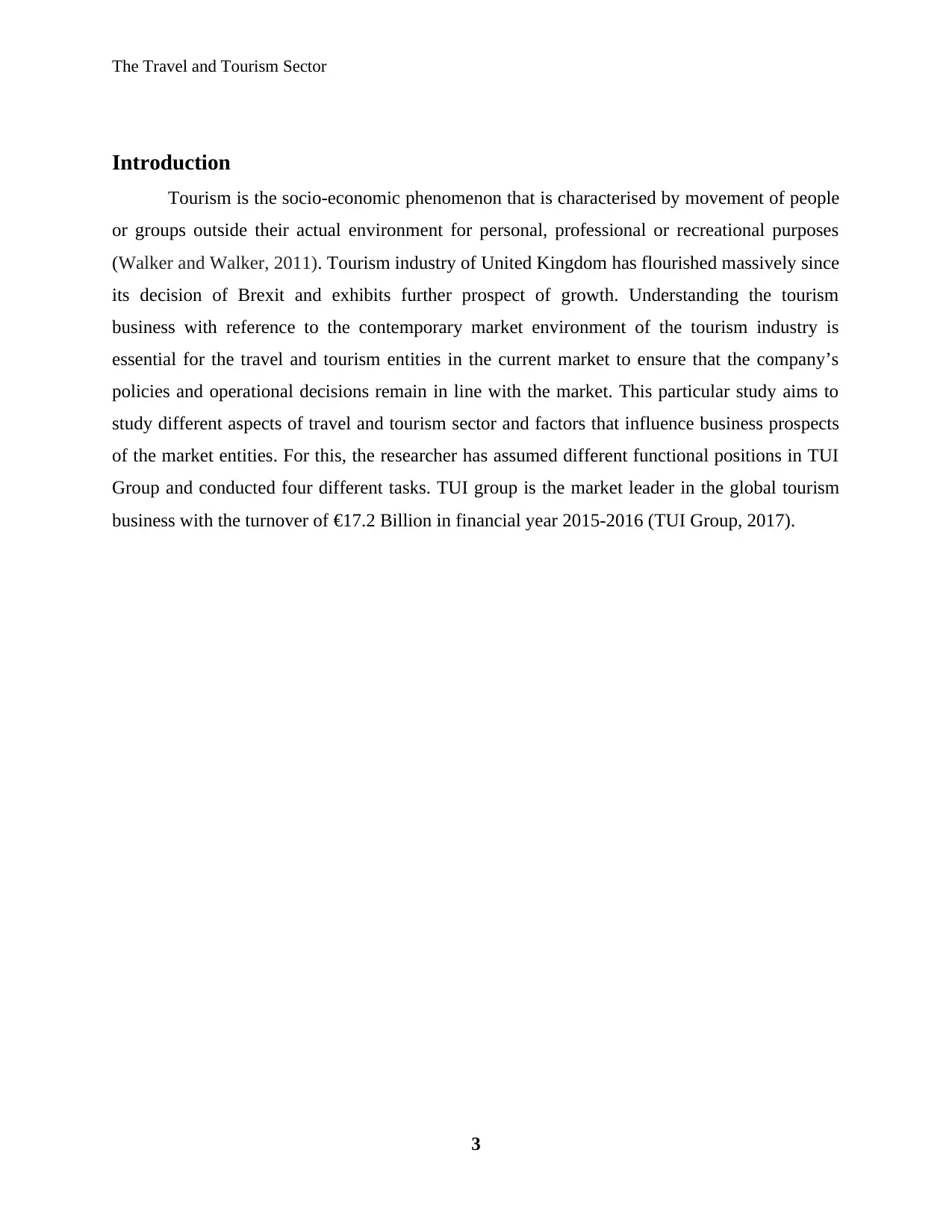
The Travel and Tourism Sector
Introduction
Tourism is the socio-economic phenomenon that is characterised by movement of people
or groups outside their actual environment for personal, professional or recreational purposes
(Walker and Walker, 2011). Tourism industry of United Kingdom has flourished massively since
its decision of Brexit and exhibits further prospect of growth. Understanding the tourism
business with reference to the contemporary market environment of the tourism industry is
essential for the travel and tourism entities in the current market to ensure that the company’s
policies and operational decisions remain in line with the market. This particular study aims to
study different aspects of travel and tourism sector and factors that influence business prospects
of the market entities. For this, the researcher has assumed different functional positions in TUI
Group and conducted four different tasks. TUI group is the market leader in the global tourism
business with the turnover of €17.2 Billion in financial year 2015-2016 (TUI Group, 2017).
3
Introduction
Tourism is the socio-economic phenomenon that is characterised by movement of people
or groups outside their actual environment for personal, professional or recreational purposes
(Walker and Walker, 2011). Tourism industry of United Kingdom has flourished massively since
its decision of Brexit and exhibits further prospect of growth. Understanding the tourism
business with reference to the contemporary market environment of the tourism industry is
essential for the travel and tourism entities in the current market to ensure that the company’s
policies and operational decisions remain in line with the market. This particular study aims to
study different aspects of travel and tourism sector and factors that influence business prospects
of the market entities. For this, the researcher has assumed different functional positions in TUI
Group and conducted four different tasks. TUI group is the market leader in the global tourism
business with the turnover of €17.2 Billion in financial year 2015-2016 (TUI Group, 2017).
3
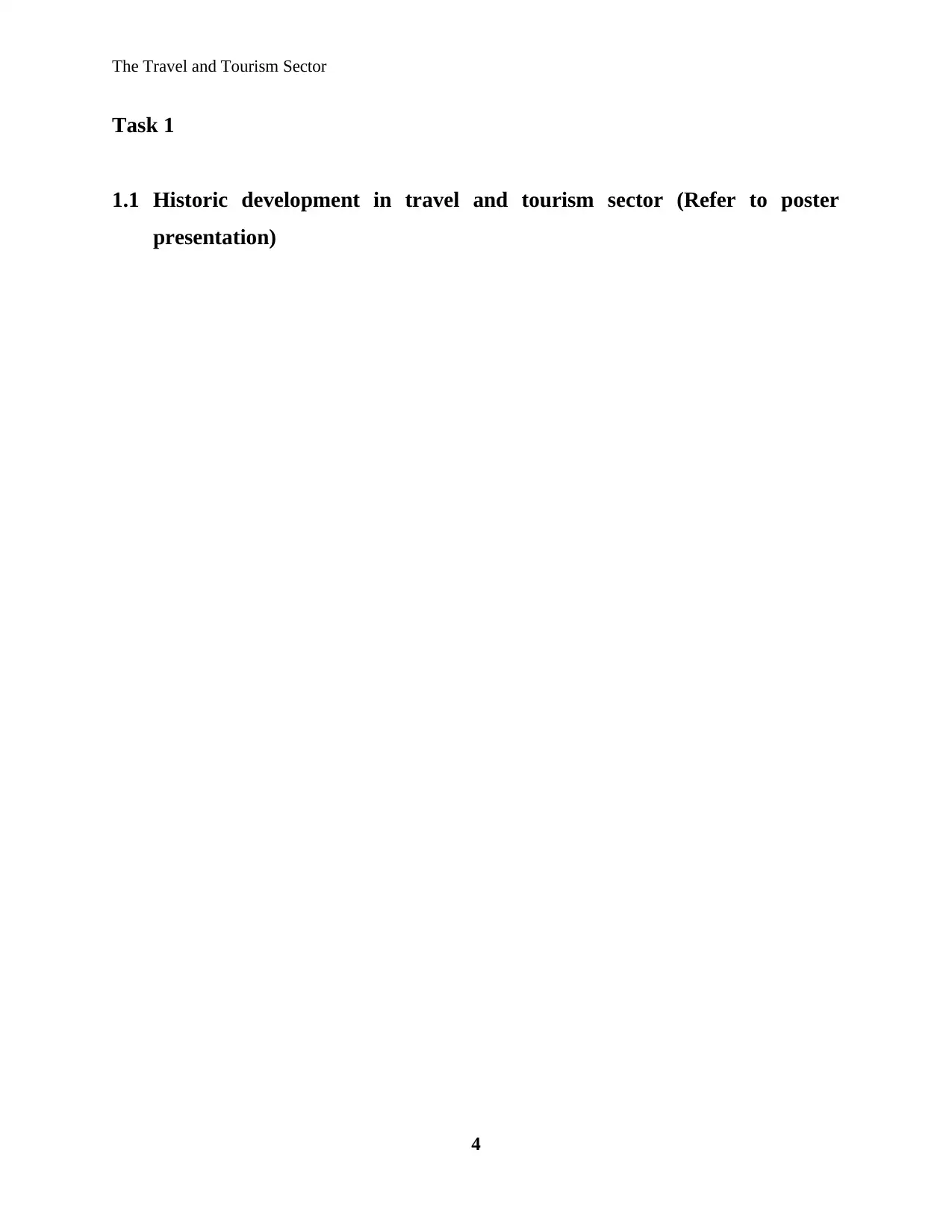
The Travel and Tourism Sector
Task 1
1.1 Historic development in travel and tourism sector (Refer to poster
presentation)
4
Task 1
1.1 Historic development in travel and tourism sector (Refer to poster
presentation)
4
Secure Best Marks with AI Grader
Need help grading? Try our AI Grader for instant feedback on your assignments.
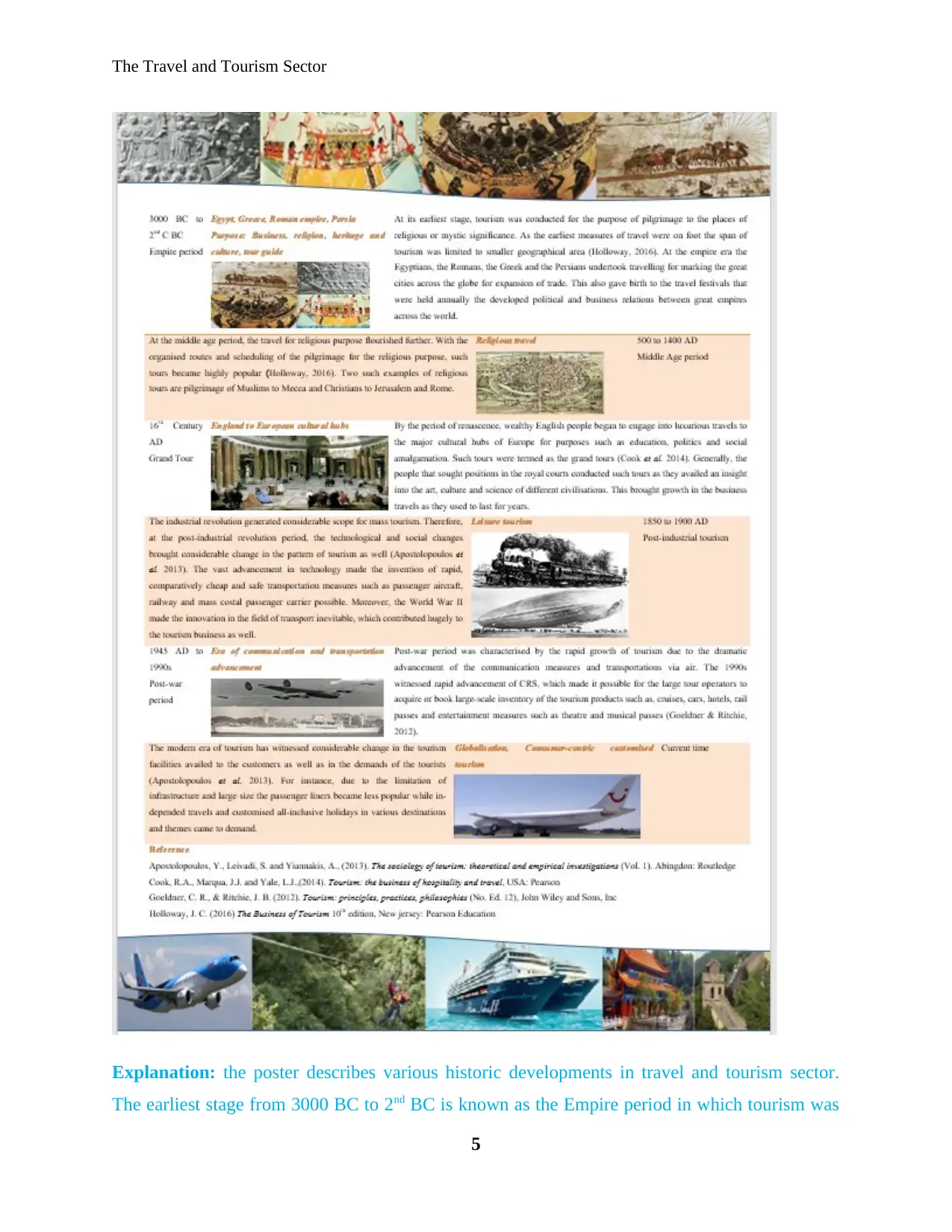
The Travel and Tourism Sector
Explanation: the poster describes various historic developments in travel and tourism sector.
The earliest stage from 3000 BC to 2nd BC is known as the Empire period in which tourism was
5
Explanation: the poster describes various historic developments in travel and tourism sector.
The earliest stage from 3000 BC to 2nd BC is known as the Empire period in which tourism was
5
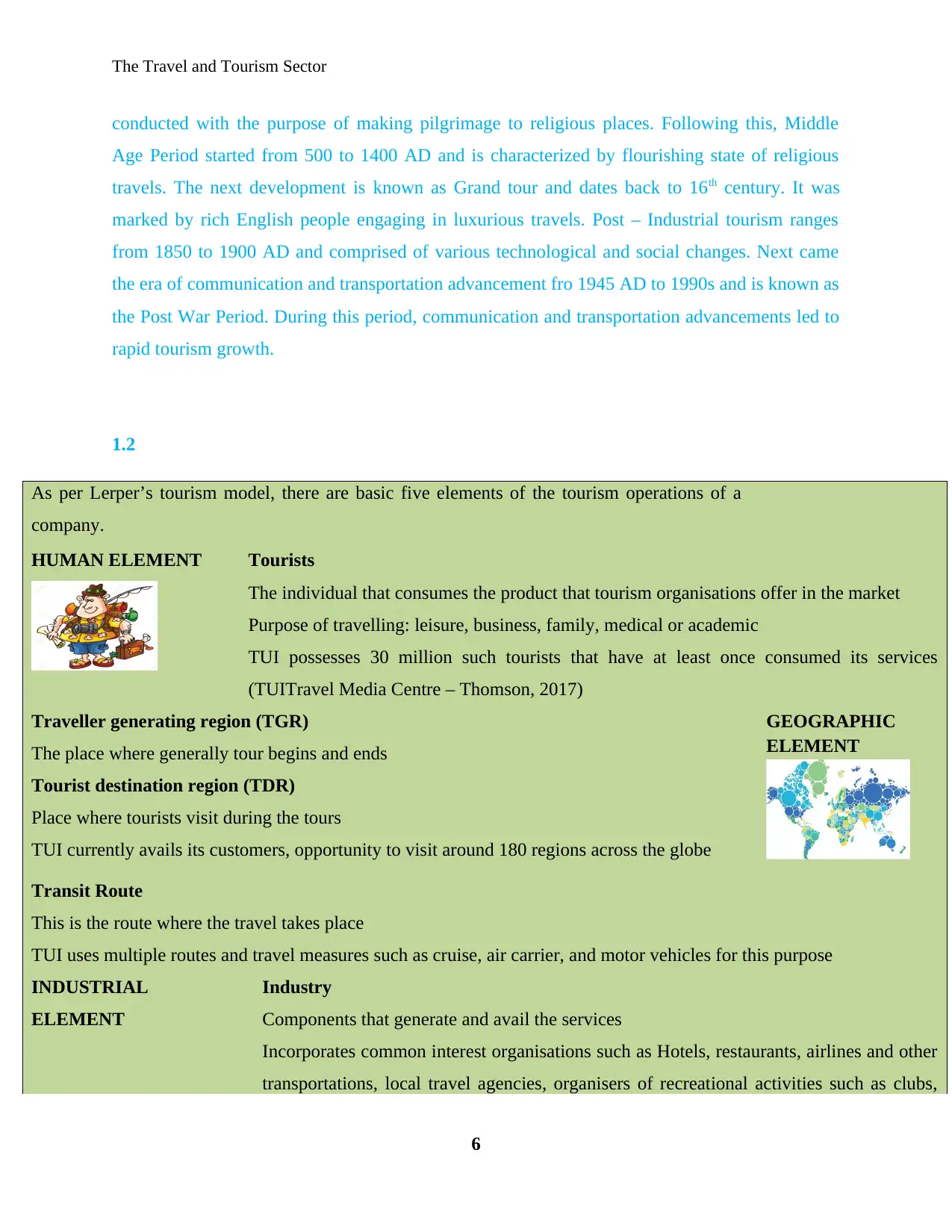
The Travel and Tourism Sector
conducted with the purpose of making pilgrimage to religious places. Following this, Middle
Age Period started from 500 to 1400 AD and is characterized by flourishing state of religious
travels. The next development is known as Grand tour and dates back to 16th century. It was
marked by rich English people engaging in luxurious travels. Post – Industrial tourism ranges
from 1850 to 1900 AD and comprised of various technological and social changes. Next came
the era of communication and transportation advancement fro 1945 AD to 1990s and is known as
the Post War Period. During this period, communication and transportation advancements led to
rapid tourism growth.
1.2
As per Lerper’s tourism model, there are basic five elements of the tourism operations of a
company.
HUMAN ELEMENT Tourists
The individual that consumes the product that tourism organisations offer in the market
Purpose of travelling: leisure, business, family, medical or academic
TUI possesses 30 million such tourists that have at least once consumed its services
(TUITravel Media Centre – Thomson, 2017)
Traveller generating region (TGR)
The place where generally tour begins and ends
Tourist destination region (TDR)
Place where tourists visit during the tours
TUI currently avails its customers, opportunity to visit around 180 regions across the globe
GEOGRAPHIC
ELEMENT
Transit Route
This is the route where the travel takes place
TUI uses multiple routes and travel measures such as cruise, air carrier, and motor vehicles for this purpose
INDUSTRIAL
ELEMENT
Industry
Components that generate and avail the services
Incorporates common interest organisations such as Hotels, restaurants, airlines and other
transportations, local travel agencies, organisers of recreational activities such as clubs,
6
conducted with the purpose of making pilgrimage to religious places. Following this, Middle
Age Period started from 500 to 1400 AD and is characterized by flourishing state of religious
travels. The next development is known as Grand tour and dates back to 16th century. It was
marked by rich English people engaging in luxurious travels. Post – Industrial tourism ranges
from 1850 to 1900 AD and comprised of various technological and social changes. Next came
the era of communication and transportation advancement fro 1945 AD to 1990s and is known as
the Post War Period. During this period, communication and transportation advancements led to
rapid tourism growth.
1.2
As per Lerper’s tourism model, there are basic five elements of the tourism operations of a
company.
HUMAN ELEMENT Tourists
The individual that consumes the product that tourism organisations offer in the market
Purpose of travelling: leisure, business, family, medical or academic
TUI possesses 30 million such tourists that have at least once consumed its services
(TUITravel Media Centre – Thomson, 2017)
Traveller generating region (TGR)
The place where generally tour begins and ends
Tourist destination region (TDR)
Place where tourists visit during the tours
TUI currently avails its customers, opportunity to visit around 180 regions across the globe
GEOGRAPHIC
ELEMENT
Transit Route
This is the route where the travel takes place
TUI uses multiple routes and travel measures such as cruise, air carrier, and motor vehicles for this purpose
INDUSTRIAL
ELEMENT
Industry
Components that generate and avail the services
Incorporates common interest organisations such as Hotels, restaurants, airlines and other
transportations, local travel agencies, organisers of recreational activities such as clubs,
6
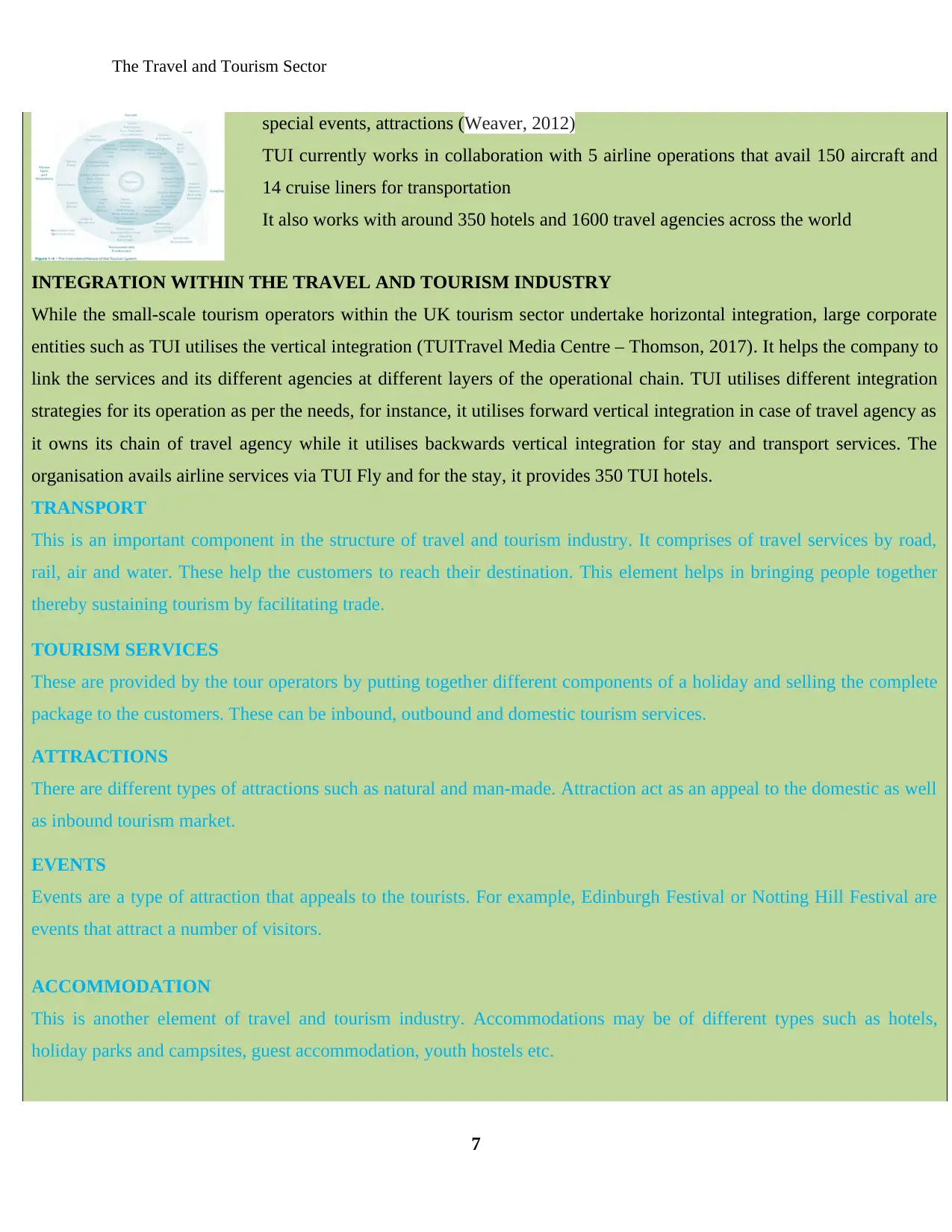
The Travel and Tourism Sector
special events, attractions (Weaver, 2012)
TUI currently works in collaboration with 5 airline operations that avail 150 aircraft and
14 cruise liners for transportation
It also works with around 350 hotels and 1600 travel agencies across the world
INTEGRATION WITHIN THE TRAVEL AND TOURISM INDUSTRY
While the small-scale tourism operators within the UK tourism sector undertake horizontal integration, large corporate
entities such as TUI utilises the vertical integration (TUITravel Media Centre – Thomson, 2017). It helps the company to
link the services and its different agencies at different layers of the operational chain. TUI utilises different integration
strategies for its operation as per the needs, for instance, it utilises forward vertical integration in case of travel agency as
it owns its chain of travel agency while it utilises backwards vertical integration for stay and transport services. The
organisation avails airline services via TUI Fly and for the stay, it provides 350 TUI hotels.
TRANSPORT
This is an important component in the structure of travel and tourism industry. It comprises of travel services by road,
rail, air and water. These help the customers to reach their destination. This element helps in bringing people together
thereby sustaining tourism by facilitating trade.
TOURISM SERVICES
These are provided by the tour operators by putting together different components of a holiday and selling the complete
package to the customers. These can be inbound, outbound and domestic tourism services.
ATTRACTIONS
There are different types of attractions such as natural and man-made. Attraction act as an appeal to the domestic as well
as inbound tourism market.
EVENTS
Events are a type of attraction that appeals to the tourists. For example, Edinburgh Festival or Notting Hill Festival are
events that attract a number of visitors.
ACCOMMODATION
This is another element of travel and tourism industry. Accommodations may be of different types such as hotels,
holiday parks and campsites, guest accommodation, youth hostels etc.
7
special events, attractions (Weaver, 2012)
TUI currently works in collaboration with 5 airline operations that avail 150 aircraft and
14 cruise liners for transportation
It also works with around 350 hotels and 1600 travel agencies across the world
INTEGRATION WITHIN THE TRAVEL AND TOURISM INDUSTRY
While the small-scale tourism operators within the UK tourism sector undertake horizontal integration, large corporate
entities such as TUI utilises the vertical integration (TUITravel Media Centre – Thomson, 2017). It helps the company to
link the services and its different agencies at different layers of the operational chain. TUI utilises different integration
strategies for its operation as per the needs, for instance, it utilises forward vertical integration in case of travel agency as
it owns its chain of travel agency while it utilises backwards vertical integration for stay and transport services. The
organisation avails airline services via TUI Fly and for the stay, it provides 350 TUI hotels.
TRANSPORT
This is an important component in the structure of travel and tourism industry. It comprises of travel services by road,
rail, air and water. These help the customers to reach their destination. This element helps in bringing people together
thereby sustaining tourism by facilitating trade.
TOURISM SERVICES
These are provided by the tour operators by putting together different components of a holiday and selling the complete
package to the customers. These can be inbound, outbound and domestic tourism services.
ATTRACTIONS
There are different types of attractions such as natural and man-made. Attraction act as an appeal to the domestic as well
as inbound tourism market.
EVENTS
Events are a type of attraction that appeals to the tourists. For example, Edinburgh Festival or Notting Hill Festival are
events that attract a number of visitors.
ACCOMMODATION
This is another element of travel and tourism industry. Accommodations may be of different types such as hotels,
holiday parks and campsites, guest accommodation, youth hostels etc.
7
Paraphrase This Document
Need a fresh take? Get an instant paraphrase of this document with our AI Paraphraser
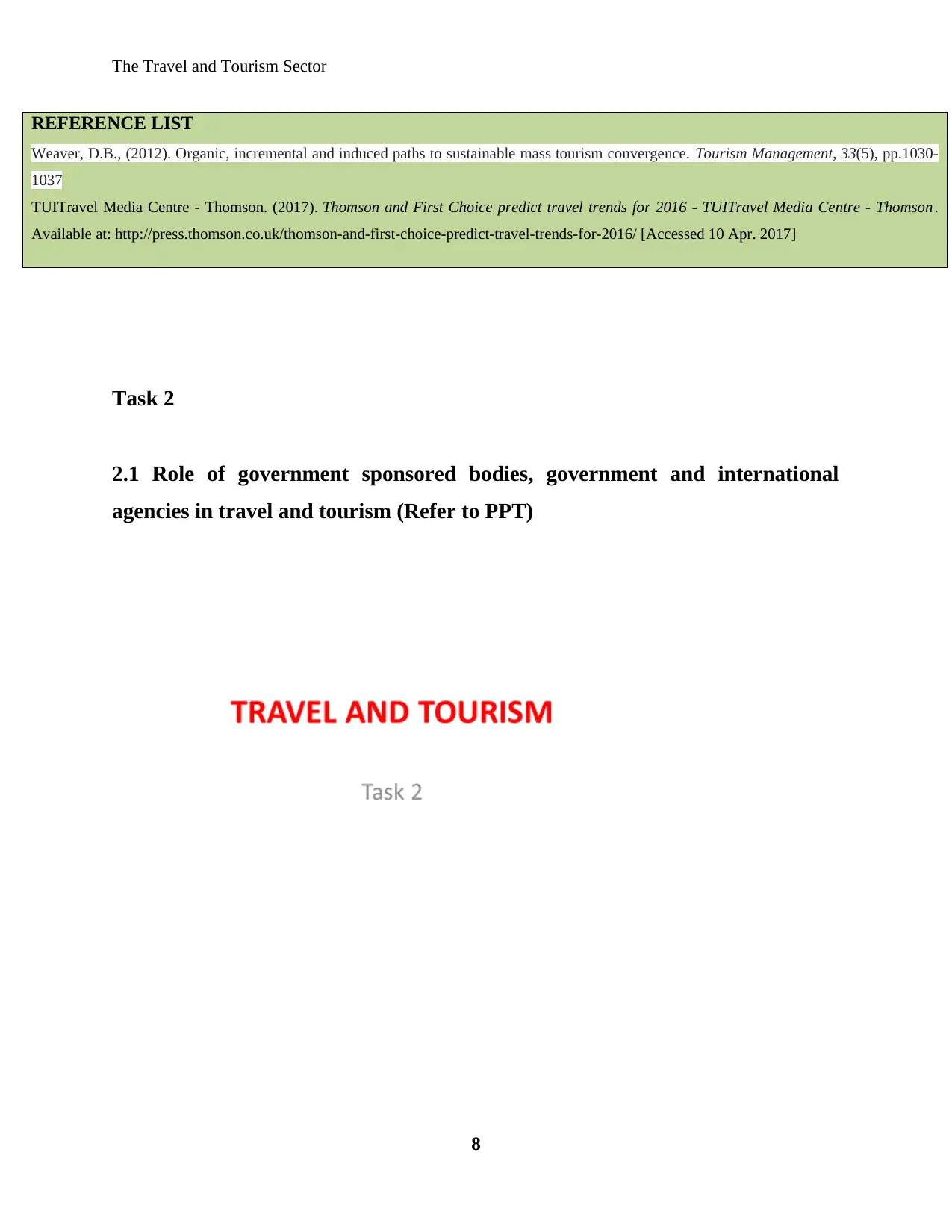
The Travel and Tourism Sector
REFERENCE LIST
Weaver, D.B., (2012). Organic, incremental and induced paths to sustainable mass tourism convergence. Tourism Management, 33(5), pp.1030-
1037
TUITravel Media Centre - Thomson. (2017). Thomson and First Choice predict travel trends for 2016 - TUITravel Media Centre - Thomson .
Available at: http://press.thomson.co.uk/thomson-and-first-choice-predict-travel-trends-for-2016/ [Accessed 10 Apr. 2017]
Task 2
2.1 Role of government sponsored bodies, government and international
agencies in travel and tourism (Refer to PPT)
8
REFERENCE LIST
Weaver, D.B., (2012). Organic, incremental and induced paths to sustainable mass tourism convergence. Tourism Management, 33(5), pp.1030-
1037
TUITravel Media Centre - Thomson. (2017). Thomson and First Choice predict travel trends for 2016 - TUITravel Media Centre - Thomson .
Available at: http://press.thomson.co.uk/thomson-and-first-choice-predict-travel-trends-for-2016/ [Accessed 10 Apr. 2017]
Task 2
2.1 Role of government sponsored bodies, government and international
agencies in travel and tourism (Refer to PPT)
8
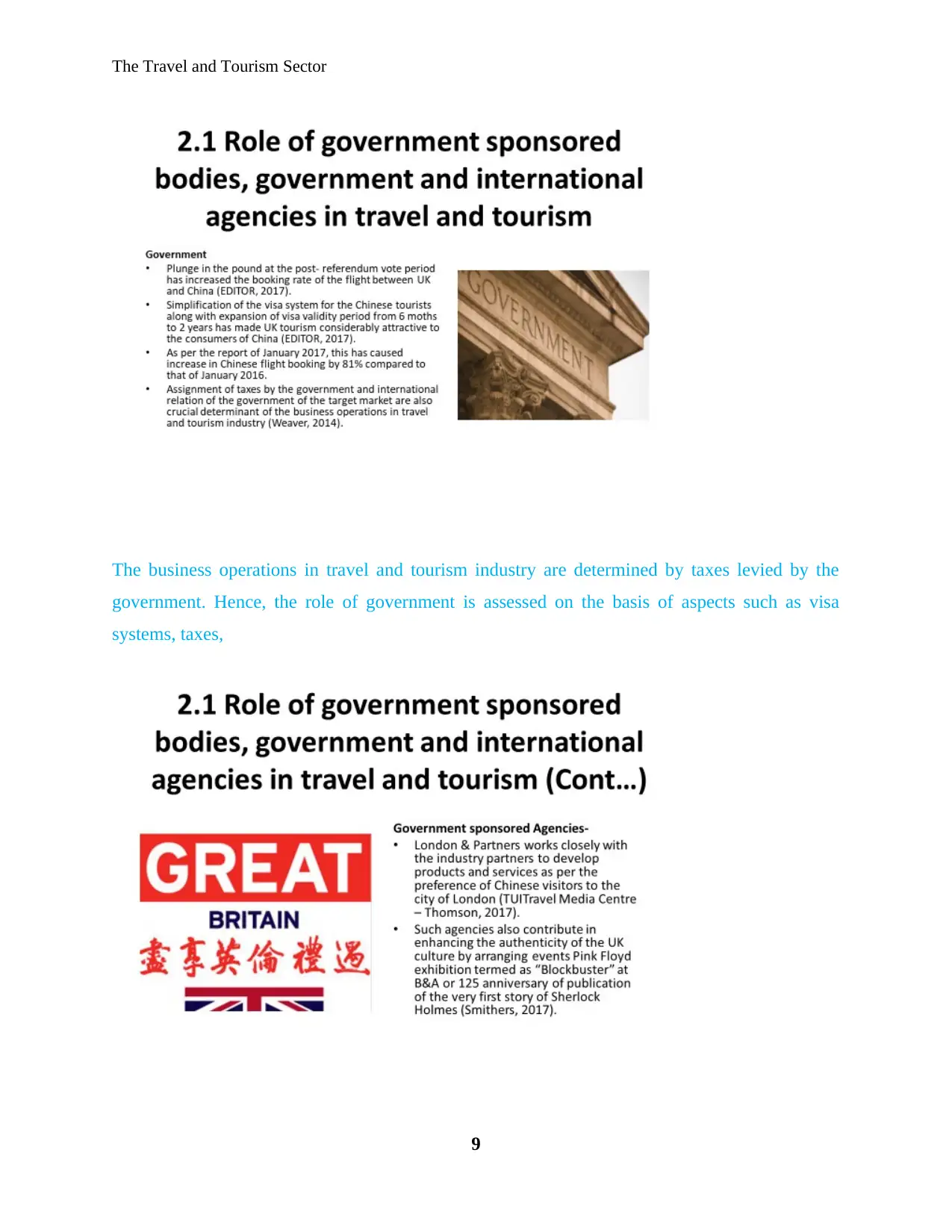
The Travel and Tourism Sector
The business operations in travel and tourism industry are determined by taxes levied by the
government. Hence, the role of government is assessed on the basis of aspects such as visa
systems, taxes,
9
The business operations in travel and tourism industry are determined by taxes levied by the
government. Hence, the role of government is assessed on the basis of aspects such as visa
systems, taxes,
9
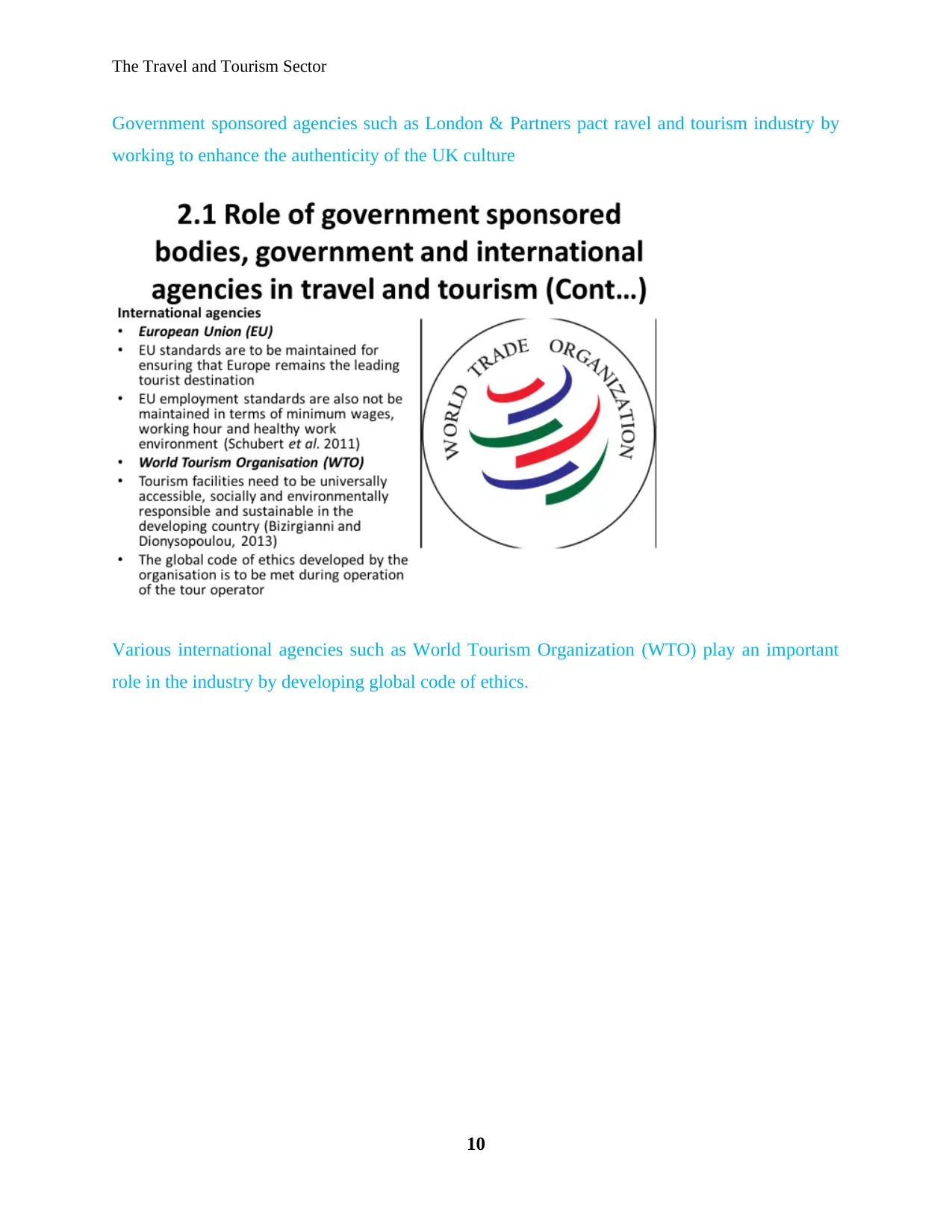
The Travel and Tourism Sector
Government sponsored agencies such as London & Partners pact ravel and tourism industry by
working to enhance the authenticity of the UK culture
Various international agencies such as World Tourism Organization (WTO) play an important
role in the industry by developing global code of ethics.
10
Government sponsored agencies such as London & Partners pact ravel and tourism industry by
working to enhance the authenticity of the UK culture
Various international agencies such as World Tourism Organization (WTO) play an important
role in the industry by developing global code of ethics.
10
Secure Best Marks with AI Grader
Need help grading? Try our AI Grader for instant feedback on your assignments.
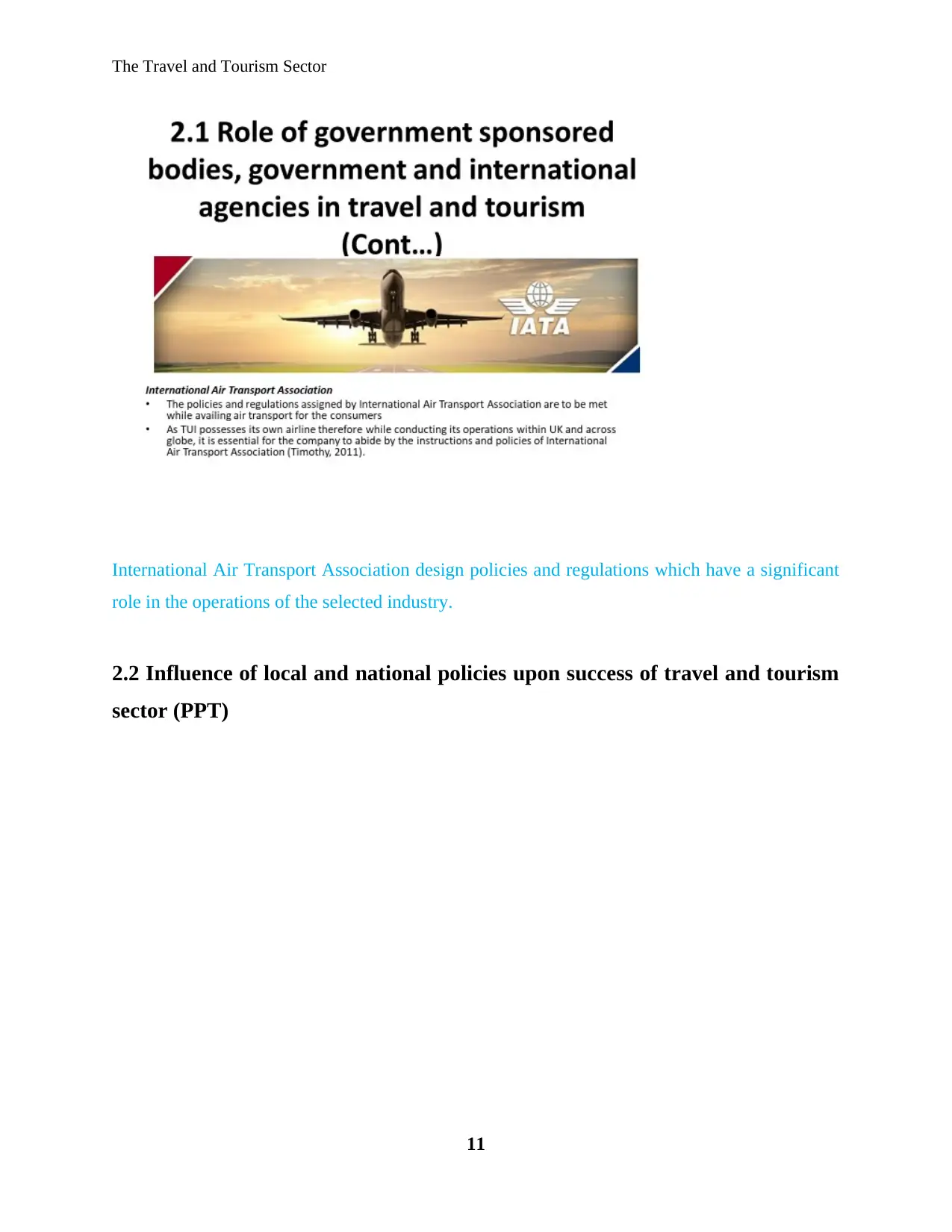
The Travel and Tourism Sector
International Air Transport Association design policies and regulations which have a significant
role in the operations of the selected industry.
2.2 Influence of local and national policies upon success of travel and tourism
sector (PPT)
11
International Air Transport Association design policies and regulations which have a significant
role in the operations of the selected industry.
2.2 Influence of local and national policies upon success of travel and tourism
sector (PPT)
11
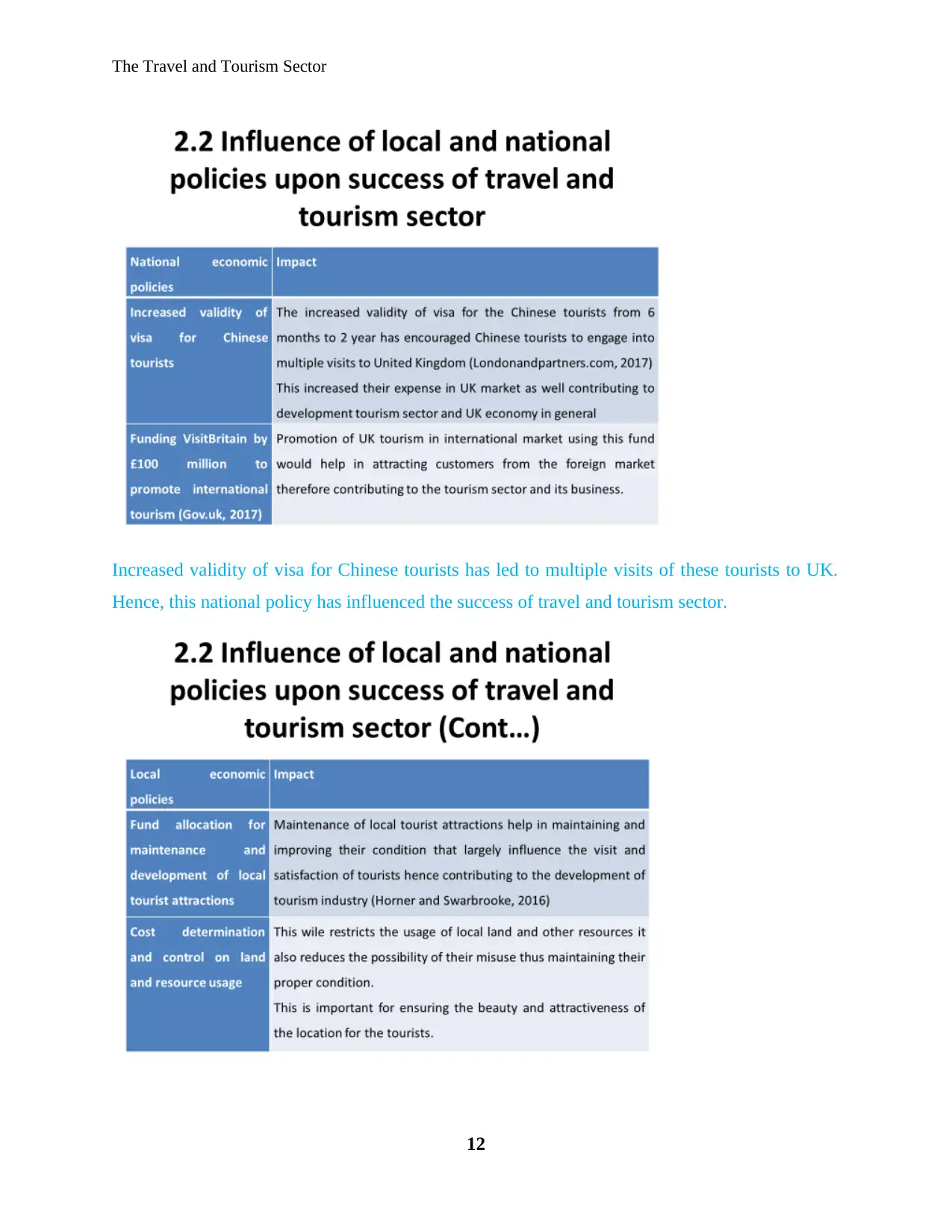
The Travel and Tourism Sector
Increased validity of visa for Chinese tourists has led to multiple visits of these tourists to UK.
Hence, this national policy has influenced the success of travel and tourism sector.
12
Increased validity of visa for Chinese tourists has led to multiple visits of these tourists to UK.
Hence, this national policy has influenced the success of travel and tourism sector.
12
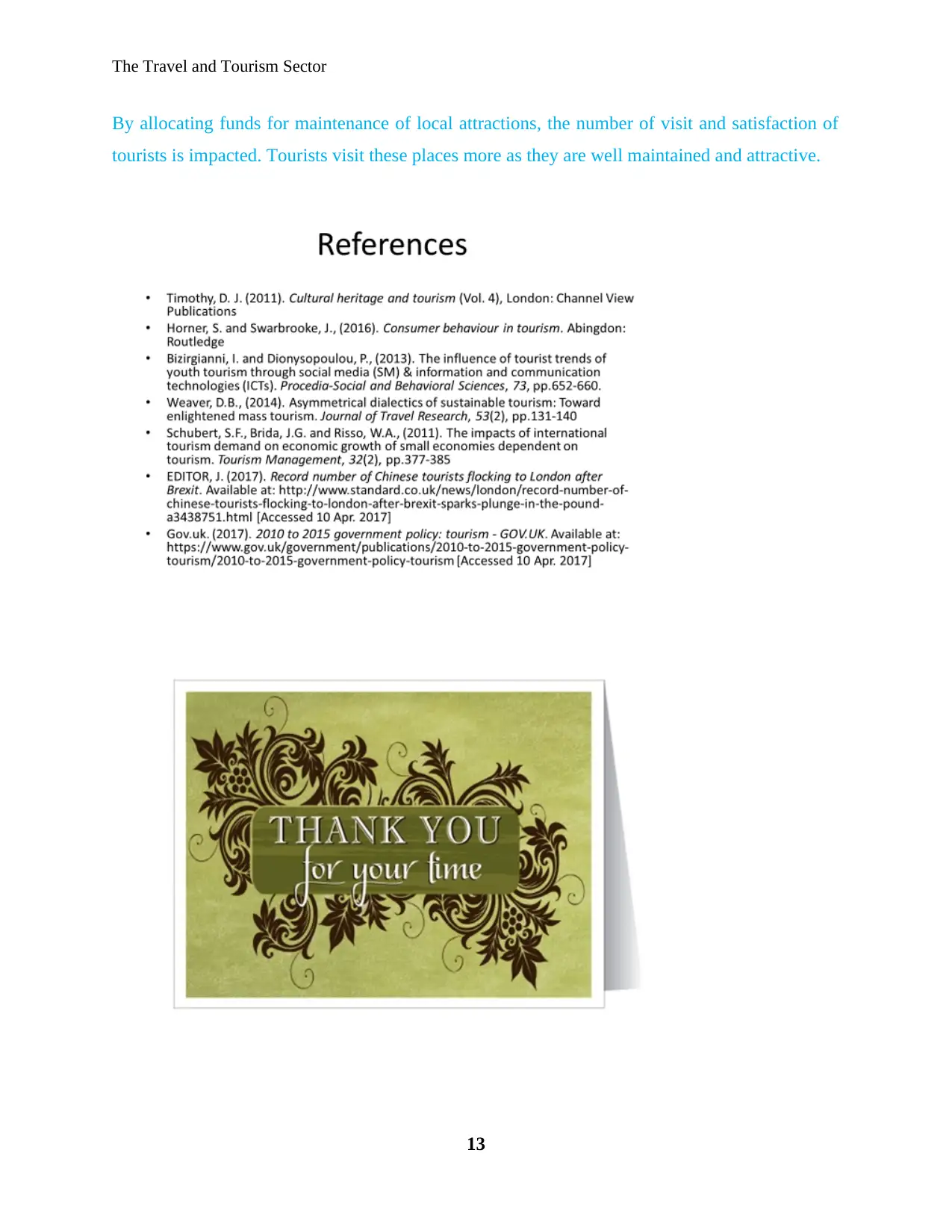
The Travel and Tourism Sector
By allocating funds for maintenance of local attractions, the number of visit and satisfaction of
tourists is impacted. Tourists visit these places more as they are well maintained and attractive.
13
By allocating funds for maintenance of local attractions, the number of visit and satisfaction of
tourists is impacted. Tourists visit these places more as they are well maintained and attractive.
13
Paraphrase This Document
Need a fresh take? Get an instant paraphrase of this document with our AI Paraphraser
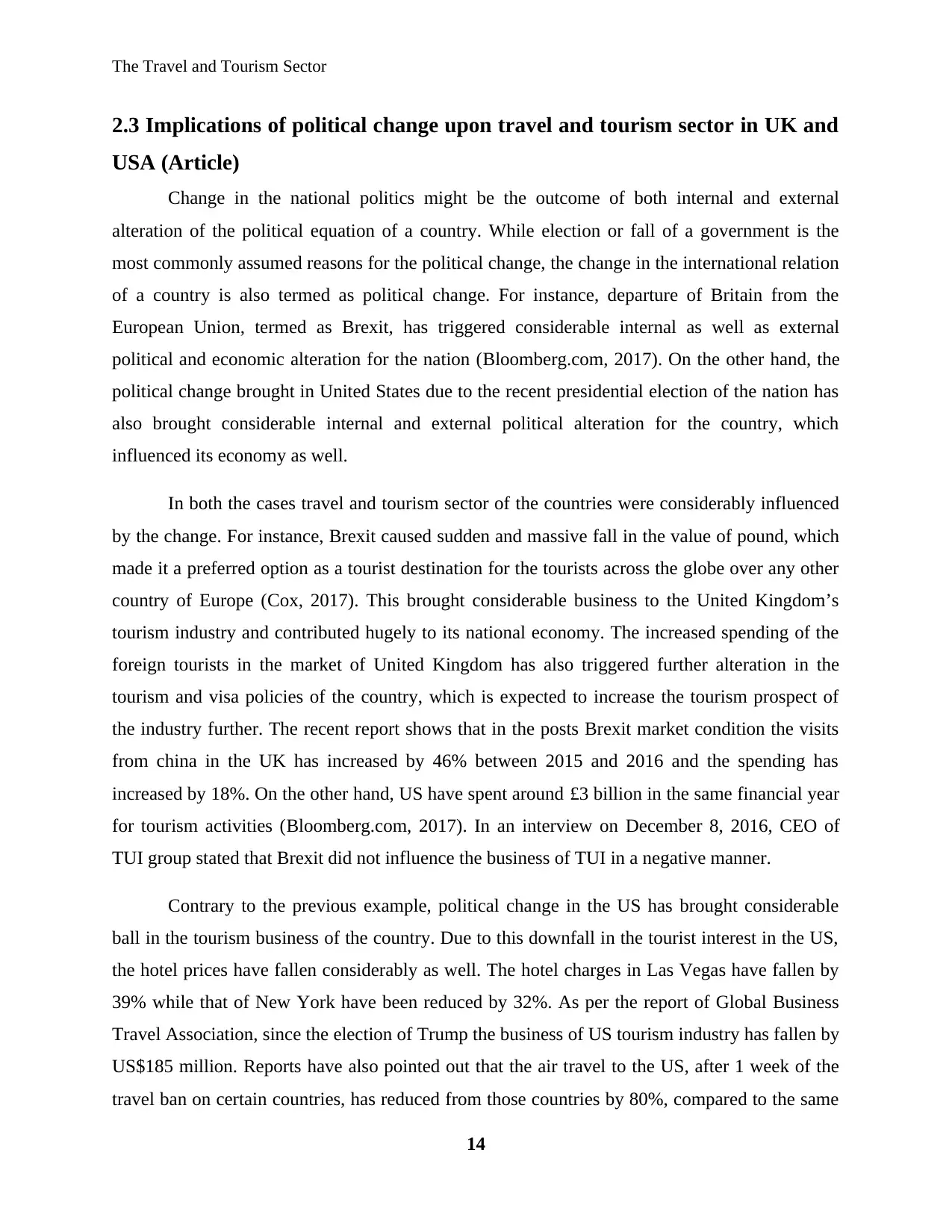
The Travel and Tourism Sector
2.3 Implications of political change upon travel and tourism sector in UK and
USA (Article)
Change in the national politics might be the outcome of both internal and external
alteration of the political equation of a country. While election or fall of a government is the
most commonly assumed reasons for the political change, the change in the international relation
of a country is also termed as political change. For instance, departure of Britain from the
European Union, termed as Brexit, has triggered considerable internal as well as external
political and economic alteration for the nation (Bloomberg.com, 2017). On the other hand, the
political change brought in United States due to the recent presidential election of the nation has
also brought considerable internal and external political alteration for the country, which
influenced its economy as well.
In both the cases travel and tourism sector of the countries were considerably influenced
by the change. For instance, Brexit caused sudden and massive fall in the value of pound, which
made it a preferred option as a tourist destination for the tourists across the globe over any other
country of Europe (Cox, 2017). This brought considerable business to the United Kingdom’s
tourism industry and contributed hugely to its national economy. The increased spending of the
foreign tourists in the market of United Kingdom has also triggered further alteration in the
tourism and visa policies of the country, which is expected to increase the tourism prospect of
the industry further. The recent report shows that in the posts Brexit market condition the visits
from china in the UK has increased by 46% between 2015 and 2016 and the spending has
increased by 18%. On the other hand, US have spent around £3 billion in the same financial year
for tourism activities (Bloomberg.com, 2017). In an interview on December 8, 2016, CEO of
TUI group stated that Brexit did not influence the business of TUI in a negative manner.
Contrary to the previous example, political change in the US has brought considerable
ball in the tourism business of the country. Due to this downfall in the tourist interest in the US,
the hotel prices have fallen considerably as well. The hotel charges in Las Vegas have fallen by
39% while that of New York have been reduced by 32%. As per the report of Global Business
Travel Association, since the election of Trump the business of US tourism industry has fallen by
US$185 million. Reports have also pointed out that the air travel to the US, after 1 week of the
travel ban on certain countries, has reduced from those countries by 80%, compared to the same
14
2.3 Implications of political change upon travel and tourism sector in UK and
USA (Article)
Change in the national politics might be the outcome of both internal and external
alteration of the political equation of a country. While election or fall of a government is the
most commonly assumed reasons for the political change, the change in the international relation
of a country is also termed as political change. For instance, departure of Britain from the
European Union, termed as Brexit, has triggered considerable internal as well as external
political and economic alteration for the nation (Bloomberg.com, 2017). On the other hand, the
political change brought in United States due to the recent presidential election of the nation has
also brought considerable internal and external political alteration for the country, which
influenced its economy as well.
In both the cases travel and tourism sector of the countries were considerably influenced
by the change. For instance, Brexit caused sudden and massive fall in the value of pound, which
made it a preferred option as a tourist destination for the tourists across the globe over any other
country of Europe (Cox, 2017). This brought considerable business to the United Kingdom’s
tourism industry and contributed hugely to its national economy. The increased spending of the
foreign tourists in the market of United Kingdom has also triggered further alteration in the
tourism and visa policies of the country, which is expected to increase the tourism prospect of
the industry further. The recent report shows that in the posts Brexit market condition the visits
from china in the UK has increased by 46% between 2015 and 2016 and the spending has
increased by 18%. On the other hand, US have spent around £3 billion in the same financial year
for tourism activities (Bloomberg.com, 2017). In an interview on December 8, 2016, CEO of
TUI group stated that Brexit did not influence the business of TUI in a negative manner.
Contrary to the previous example, political change in the US has brought considerable
ball in the tourism business of the country. Due to this downfall in the tourist interest in the US,
the hotel prices have fallen considerably as well. The hotel charges in Las Vegas have fallen by
39% while that of New York have been reduced by 32%. As per the report of Global Business
Travel Association, since the election of Trump the business of US tourism industry has fallen by
US$185 million. Reports have also pointed out that the air travel to the US, after 1 week of the
travel ban on certain countries, has reduced from those countries by 80%, compared to the same
14
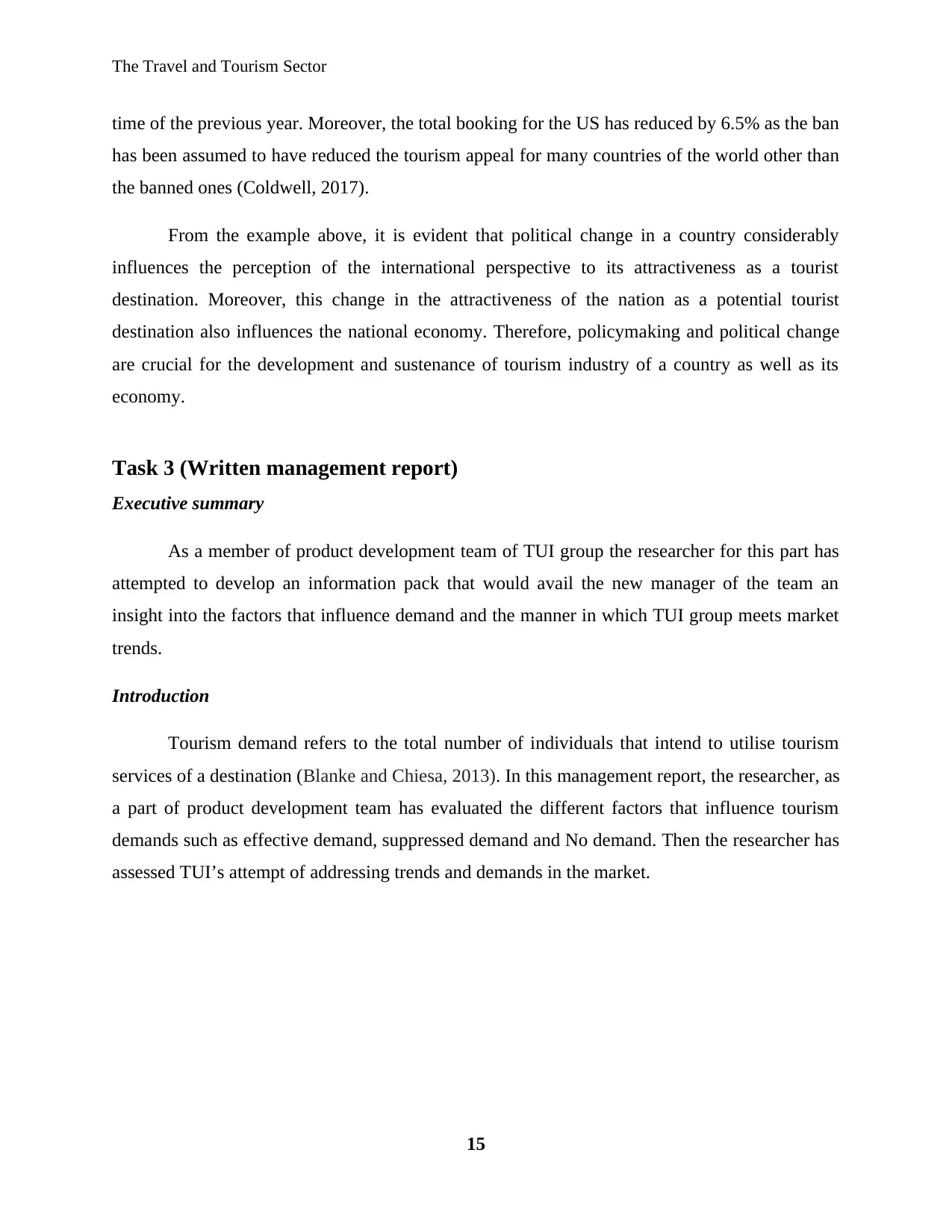
The Travel and Tourism Sector
time of the previous year. Moreover, the total booking for the US has reduced by 6.5% as the ban
has been assumed to have reduced the tourism appeal for many countries of the world other than
the banned ones (Coldwell, 2017).
From the example above, it is evident that political change in a country considerably
influences the perception of the international perspective to its attractiveness as a tourist
destination. Moreover, this change in the attractiveness of the nation as a potential tourist
destination also influences the national economy. Therefore, policymaking and political change
are crucial for the development and sustenance of tourism industry of a country as well as its
economy.
Task 3 (Written management report)
Executive summary
As a member of product development team of TUI group the researcher for this part has
attempted to develop an information pack that would avail the new manager of the team an
insight into the factors that influence demand and the manner in which TUI group meets market
trends.
Introduction
Tourism demand refers to the total number of individuals that intend to utilise tourism
services of a destination (Blanke and Chiesa, 2013). In this management report, the researcher, as
a part of product development team has evaluated the different factors that influence tourism
demands such as effective demand, suppressed demand and No demand. Then the researcher has
assessed TUI’s attempt of addressing trends and demands in the market.
15
time of the previous year. Moreover, the total booking for the US has reduced by 6.5% as the ban
has been assumed to have reduced the tourism appeal for many countries of the world other than
the banned ones (Coldwell, 2017).
From the example above, it is evident that political change in a country considerably
influences the perception of the international perspective to its attractiveness as a tourist
destination. Moreover, this change in the attractiveness of the nation as a potential tourist
destination also influences the national economy. Therefore, policymaking and political change
are crucial for the development and sustenance of tourism industry of a country as well as its
economy.
Task 3 (Written management report)
Executive summary
As a member of product development team of TUI group the researcher for this part has
attempted to develop an information pack that would avail the new manager of the team an
insight into the factors that influence demand and the manner in which TUI group meets market
trends.
Introduction
Tourism demand refers to the total number of individuals that intend to utilise tourism
services of a destination (Blanke and Chiesa, 2013). In this management report, the researcher, as
a part of product development team has evaluated the different factors that influence tourism
demands such as effective demand, suppressed demand and No demand. Then the researcher has
assessed TUI’s attempt of addressing trends and demands in the market.
15
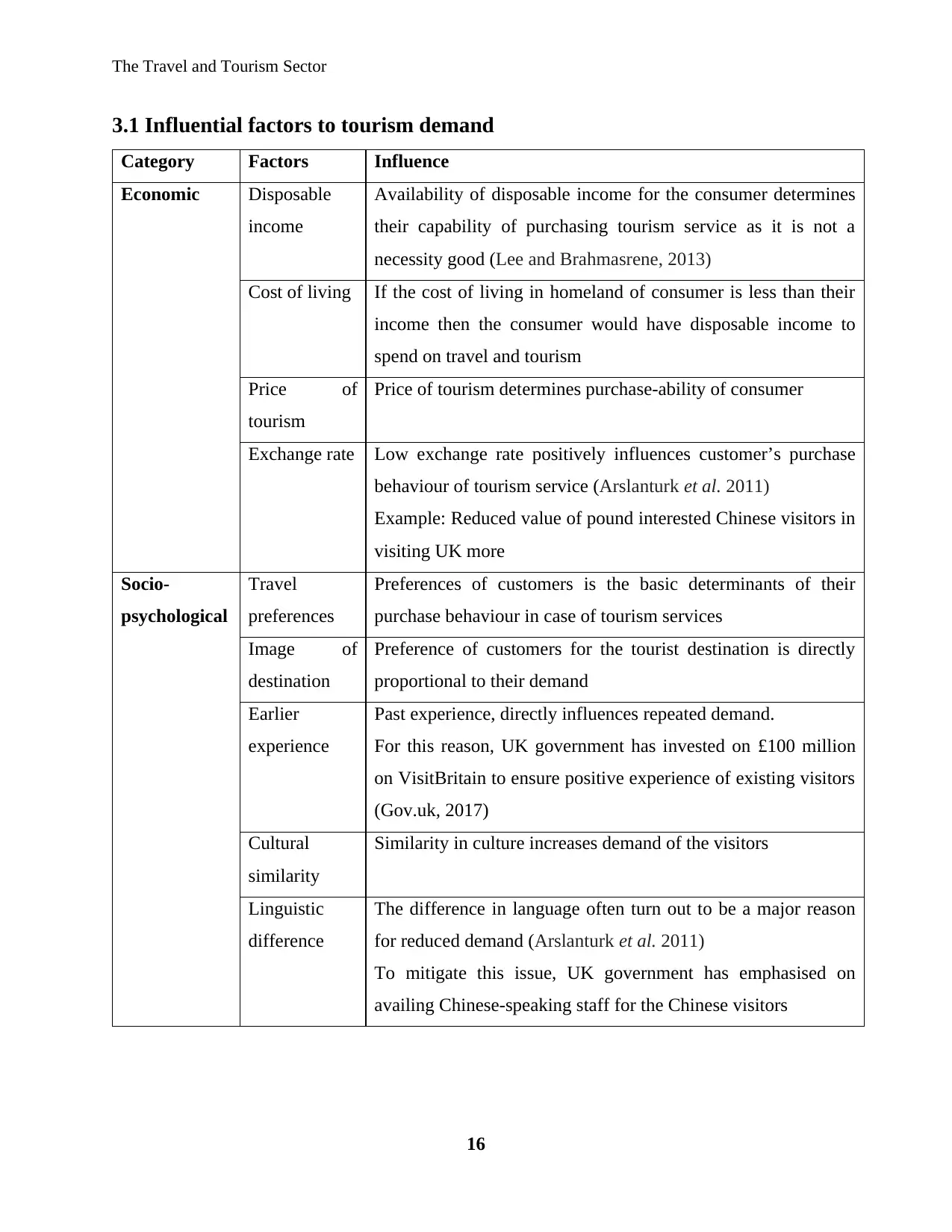
The Travel and Tourism Sector
3.1 Influential factors to tourism demand
Category Factors Influence
Economic Disposable
income
Availability of disposable income for the consumer determines
their capability of purchasing tourism service as it is not a
necessity good (Lee and Brahmasrene, 2013)
Cost of living If the cost of living in homeland of consumer is less than their
income then the consumer would have disposable income to
spend on travel and tourism
Price of
tourism
Price of tourism determines purchase-ability of consumer
Exchange rate Low exchange rate positively influences customer’s purchase
behaviour of tourism service (Arslanturk et al. 2011)
Example: Reduced value of pound interested Chinese visitors in
visiting UK more
Socio-
psychological
Travel
preferences
Preferences of customers is the basic determinants of their
purchase behaviour in case of tourism services
Image of
destination
Preference of customers for the tourist destination is directly
proportional to their demand
Earlier
experience
Past experience, directly influences repeated demand.
For this reason, UK government has invested on £100 million
on VisitBritain to ensure positive experience of existing visitors
(Gov.uk, 2017)
Cultural
similarity
Similarity in culture increases demand of the visitors
Linguistic
difference
The difference in language often turn out to be a major reason
for reduced demand (Arslanturk et al. 2011)
To mitigate this issue, UK government has emphasised on
availing Chinese-speaking staff for the Chinese visitors
16
3.1 Influential factors to tourism demand
Category Factors Influence
Economic Disposable
income
Availability of disposable income for the consumer determines
their capability of purchasing tourism service as it is not a
necessity good (Lee and Brahmasrene, 2013)
Cost of living If the cost of living in homeland of consumer is less than their
income then the consumer would have disposable income to
spend on travel and tourism
Price of
tourism
Price of tourism determines purchase-ability of consumer
Exchange rate Low exchange rate positively influences customer’s purchase
behaviour of tourism service (Arslanturk et al. 2011)
Example: Reduced value of pound interested Chinese visitors in
visiting UK more
Socio-
psychological
Travel
preferences
Preferences of customers is the basic determinants of their
purchase behaviour in case of tourism services
Image of
destination
Preference of customers for the tourist destination is directly
proportional to their demand
Earlier
experience
Past experience, directly influences repeated demand.
For this reason, UK government has invested on £100 million
on VisitBritain to ensure positive experience of existing visitors
(Gov.uk, 2017)
Cultural
similarity
Similarity in culture increases demand of the visitors
Linguistic
difference
The difference in language often turn out to be a major reason
for reduced demand (Arslanturk et al. 2011)
To mitigate this issue, UK government has emphasised on
availing Chinese-speaking staff for the Chinese visitors
16
Secure Best Marks with AI Grader
Need help grading? Try our AI Grader for instant feedback on your assignments.
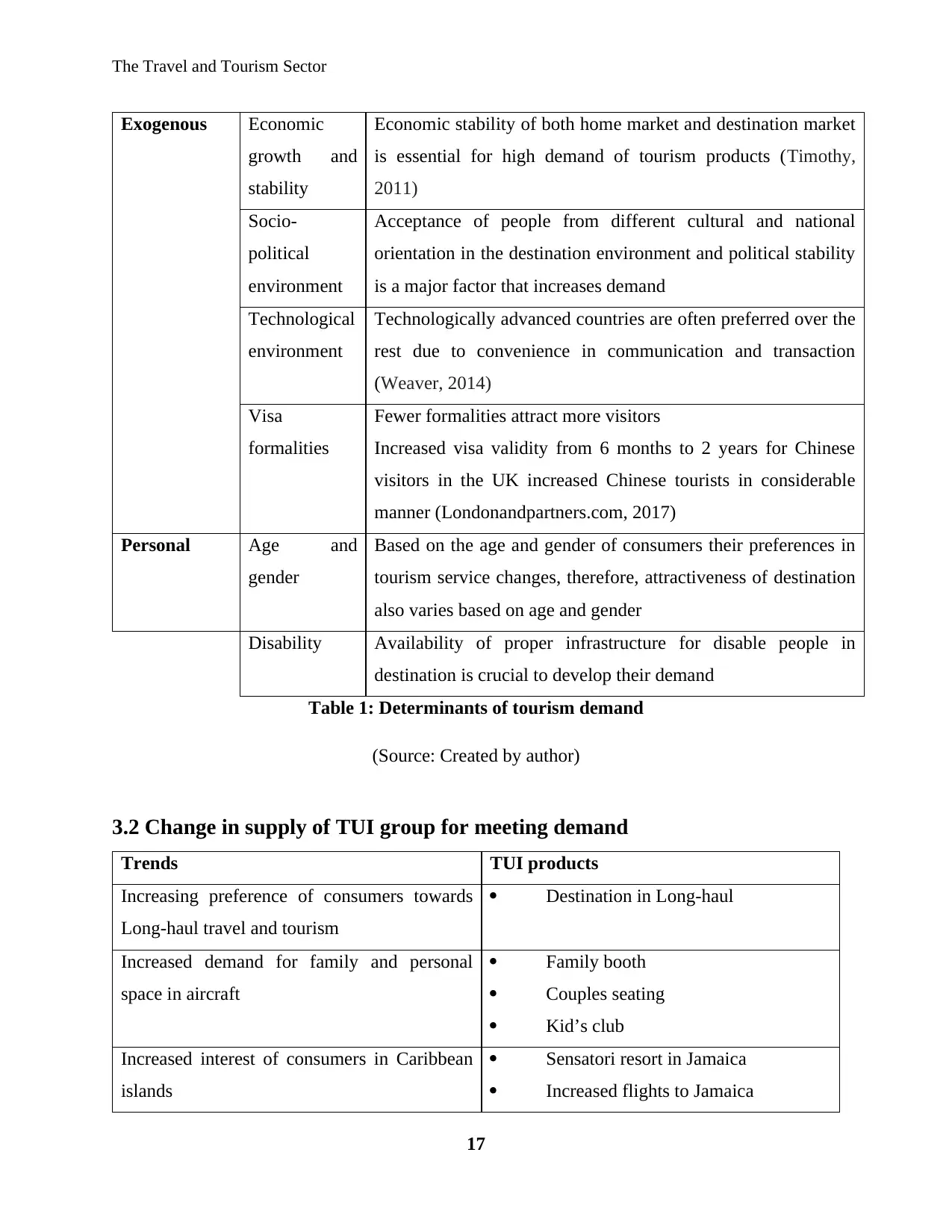
The Travel and Tourism Sector
Exogenous Economic
growth and
stability
Economic stability of both home market and destination market
is essential for high demand of tourism products (Timothy,
2011)
Socio-
political
environment
Acceptance of people from different cultural and national
orientation in the destination environment and political stability
is a major factor that increases demand
Technological
environment
Technologically advanced countries are often preferred over the
rest due to convenience in communication and transaction
(Weaver, 2014)
Visa
formalities
Fewer formalities attract more visitors
Increased visa validity from 6 months to 2 years for Chinese
visitors in the UK increased Chinese tourists in considerable
manner (Londonandpartners.com, 2017)
Personal Age and
gender
Based on the age and gender of consumers their preferences in
tourism service changes, therefore, attractiveness of destination
also varies based on age and gender
Disability Availability of proper infrastructure for disable people in
destination is crucial to develop their demand
Table 1: Determinants of tourism demand
(Source: Created by author)
3.2 Change in supply of TUI group for meeting demand
Trends TUI products
Increasing preference of consumers towards
Long-haul travel and tourism
Destination in Long-haul
Increased demand for family and personal
space in aircraft
Family booth
Couples seating
Kid’s club
Increased interest of consumers in Caribbean
islands
Sensatori resort in Jamaica
Increased flights to Jamaica
17
Exogenous Economic
growth and
stability
Economic stability of both home market and destination market
is essential for high demand of tourism products (Timothy,
2011)
Socio-
political
environment
Acceptance of people from different cultural and national
orientation in the destination environment and political stability
is a major factor that increases demand
Technological
environment
Technologically advanced countries are often preferred over the
rest due to convenience in communication and transaction
(Weaver, 2014)
Visa
formalities
Fewer formalities attract more visitors
Increased visa validity from 6 months to 2 years for Chinese
visitors in the UK increased Chinese tourists in considerable
manner (Londonandpartners.com, 2017)
Personal Age and
gender
Based on the age and gender of consumers their preferences in
tourism service changes, therefore, attractiveness of destination
also varies based on age and gender
Disability Availability of proper infrastructure for disable people in
destination is crucial to develop their demand
Table 1: Determinants of tourism demand
(Source: Created by author)
3.2 Change in supply of TUI group for meeting demand
Trends TUI products
Increasing preference of consumers towards
Long-haul travel and tourism
Destination in Long-haul
Increased demand for family and personal
space in aircraft
Family booth
Couples seating
Kid’s club
Increased interest of consumers in Caribbean
islands
Sensatori resort in Jamaica
Increased flights to Jamaica
17
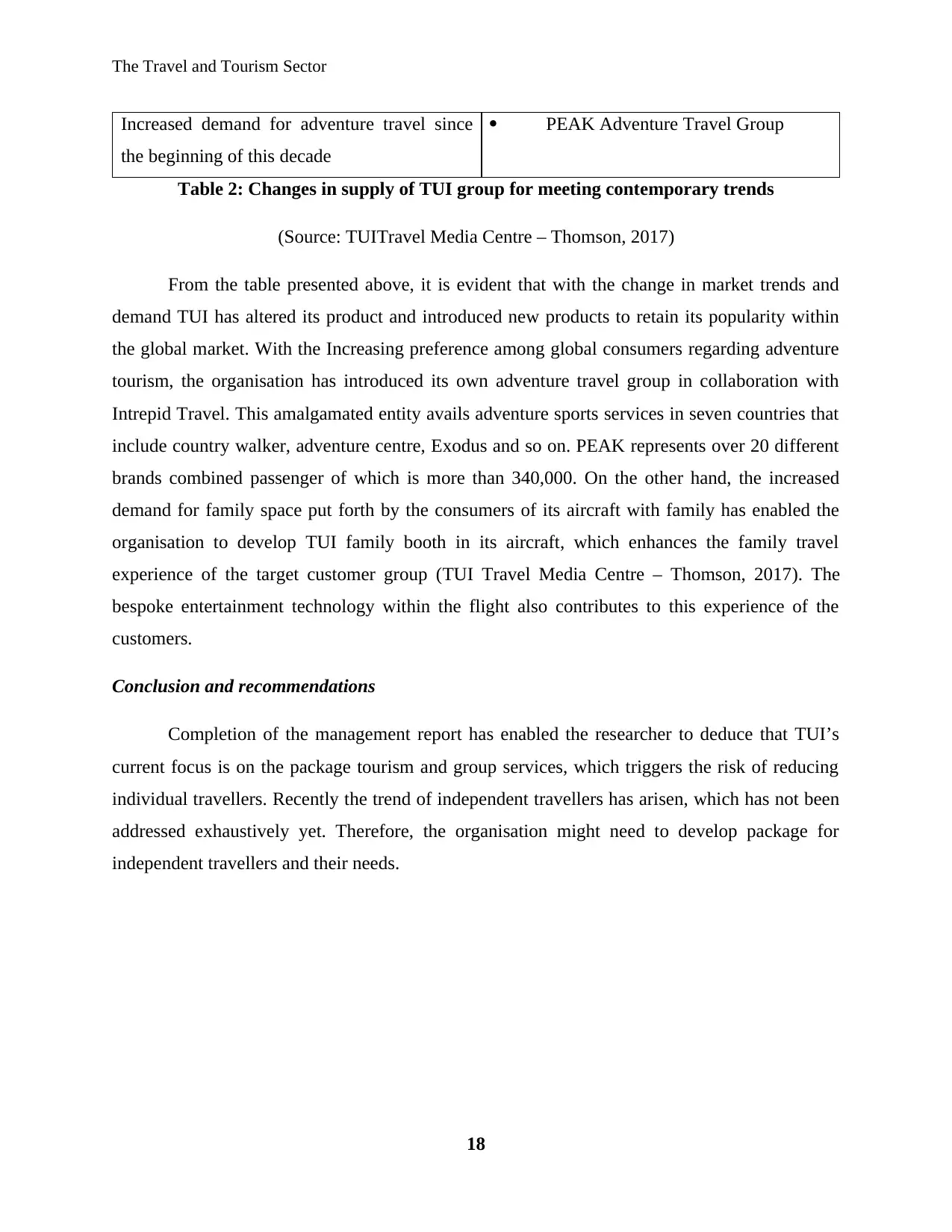
The Travel and Tourism Sector
Increased demand for adventure travel since
the beginning of this decade
PEAK Adventure Travel Group
Table 2: Changes in supply of TUI group for meeting contemporary trends
(Source: TUITravel Media Centre – Thomson, 2017)
From the table presented above, it is evident that with the change in market trends and
demand TUI has altered its product and introduced new products to retain its popularity within
the global market. With the Increasing preference among global consumers regarding adventure
tourism, the organisation has introduced its own adventure travel group in collaboration with
Intrepid Travel. This amalgamated entity avails adventure sports services in seven countries that
include country walker, adventure centre, Exodus and so on. PEAK represents over 20 different
brands combined passenger of which is more than 340,000. On the other hand, the increased
demand for family space put forth by the consumers of its aircraft with family has enabled the
organisation to develop TUI family booth in its aircraft, which enhances the family travel
experience of the target customer group (TUI Travel Media Centre – Thomson, 2017). The
bespoke entertainment technology within the flight also contributes to this experience of the
customers.
Conclusion and recommendations
Completion of the management report has enabled the researcher to deduce that TUI’s
current focus is on the package tourism and group services, which triggers the risk of reducing
individual travellers. Recently the trend of independent travellers has arisen, which has not been
addressed exhaustively yet. Therefore, the organisation might need to develop package for
independent travellers and their needs.
18
Increased demand for adventure travel since
the beginning of this decade
PEAK Adventure Travel Group
Table 2: Changes in supply of TUI group for meeting contemporary trends
(Source: TUITravel Media Centre – Thomson, 2017)
From the table presented above, it is evident that with the change in market trends and
demand TUI has altered its product and introduced new products to retain its popularity within
the global market. With the Increasing preference among global consumers regarding adventure
tourism, the organisation has introduced its own adventure travel group in collaboration with
Intrepid Travel. This amalgamated entity avails adventure sports services in seven countries that
include country walker, adventure centre, Exodus and so on. PEAK represents over 20 different
brands combined passenger of which is more than 340,000. On the other hand, the increased
demand for family space put forth by the consumers of its aircraft with family has enabled the
organisation to develop TUI family booth in its aircraft, which enhances the family travel
experience of the target customer group (TUI Travel Media Centre – Thomson, 2017). The
bespoke entertainment technology within the flight also contributes to this experience of the
customers.
Conclusion and recommendations
Completion of the management report has enabled the researcher to deduce that TUI’s
current focus is on the package tourism and group services, which triggers the risk of reducing
individual travellers. Recently the trend of independent travellers has arisen, which has not been
addressed exhaustively yet. Therefore, the organisation might need to develop package for
independent travellers and their needs.
18
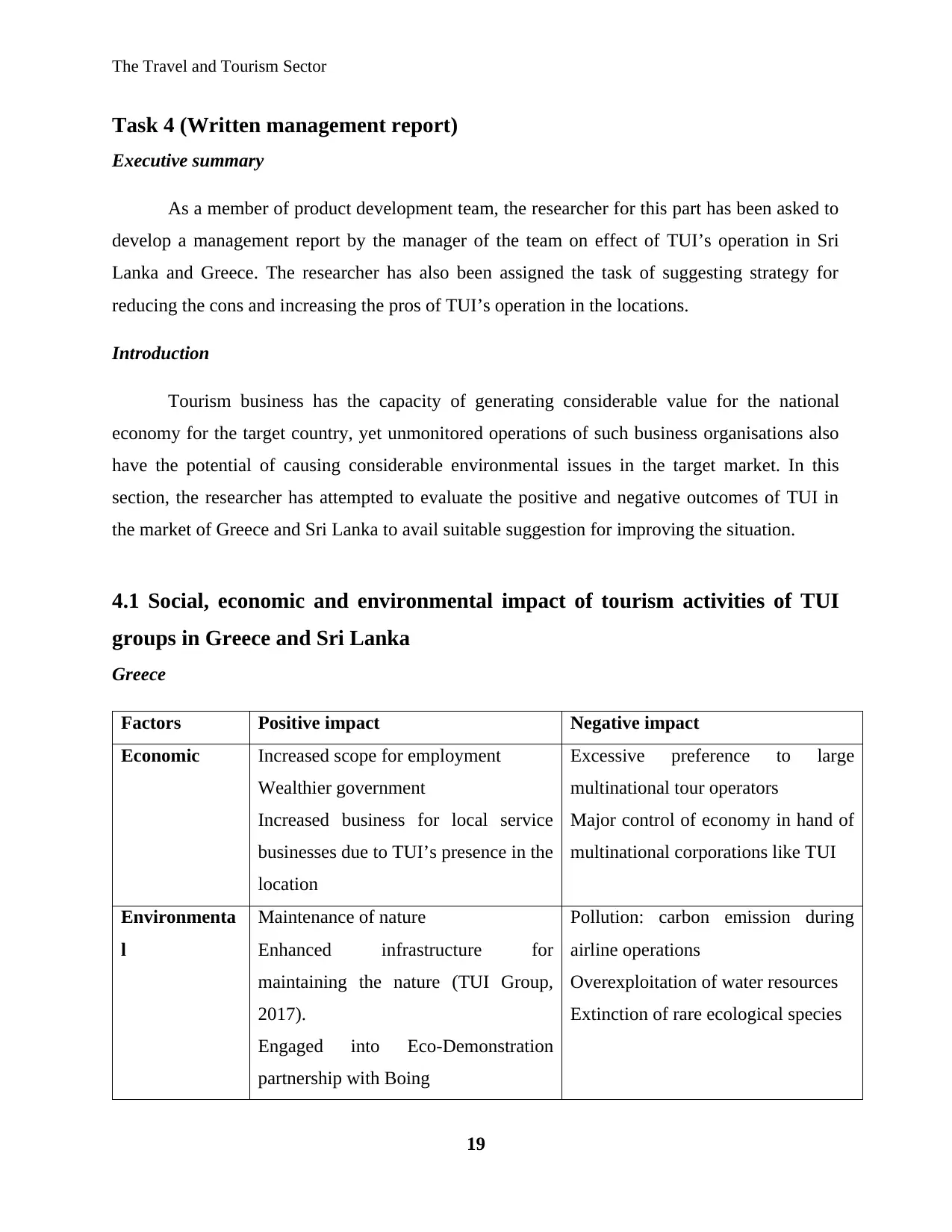
The Travel and Tourism Sector
Task 4 (Written management report)
Executive summary
As a member of product development team, the researcher for this part has been asked to
develop a management report by the manager of the team on effect of TUI’s operation in Sri
Lanka and Greece. The researcher has also been assigned the task of suggesting strategy for
reducing the cons and increasing the pros of TUI’s operation in the locations.
Introduction
Tourism business has the capacity of generating considerable value for the national
economy for the target country, yet unmonitored operations of such business organisations also
have the potential of causing considerable environmental issues in the target market. In this
section, the researcher has attempted to evaluate the positive and negative outcomes of TUI in
the market of Greece and Sri Lanka to avail suitable suggestion for improving the situation.
4.1 Social, economic and environmental impact of tourism activities of TUI
groups in Greece and Sri Lanka
Greece
Factors Positive impact Negative impact
Economic Increased scope for employment
Wealthier government
Increased business for local service
businesses due to TUI’s presence in the
location
Excessive preference to large
multinational tour operators
Major control of economy in hand of
multinational corporations like TUI
Environmenta
l
Maintenance of nature
Enhanced infrastructure for
maintaining the nature (TUI Group,
2017).
Engaged into Eco-Demonstration
partnership with Boing
Pollution: carbon emission during
airline operations
Overexploitation of water resources
Extinction of rare ecological species
19
Task 4 (Written management report)
Executive summary
As a member of product development team, the researcher for this part has been asked to
develop a management report by the manager of the team on effect of TUI’s operation in Sri
Lanka and Greece. The researcher has also been assigned the task of suggesting strategy for
reducing the cons and increasing the pros of TUI’s operation in the locations.
Introduction
Tourism business has the capacity of generating considerable value for the national
economy for the target country, yet unmonitored operations of such business organisations also
have the potential of causing considerable environmental issues in the target market. In this
section, the researcher has attempted to evaluate the positive and negative outcomes of TUI in
the market of Greece and Sri Lanka to avail suitable suggestion for improving the situation.
4.1 Social, economic and environmental impact of tourism activities of TUI
groups in Greece and Sri Lanka
Greece
Factors Positive impact Negative impact
Economic Increased scope for employment
Wealthier government
Increased business for local service
businesses due to TUI’s presence in the
location
Excessive preference to large
multinational tour operators
Major control of economy in hand of
multinational corporations like TUI
Environmenta
l
Maintenance of nature
Enhanced infrastructure for
maintaining the nature (TUI Group,
2017).
Engaged into Eco-Demonstration
partnership with Boing
Pollution: carbon emission during
airline operations
Overexploitation of water resources
Extinction of rare ecological species
19
Paraphrase This Document
Need a fresh take? Get an instant paraphrase of this document with our AI Paraphraser
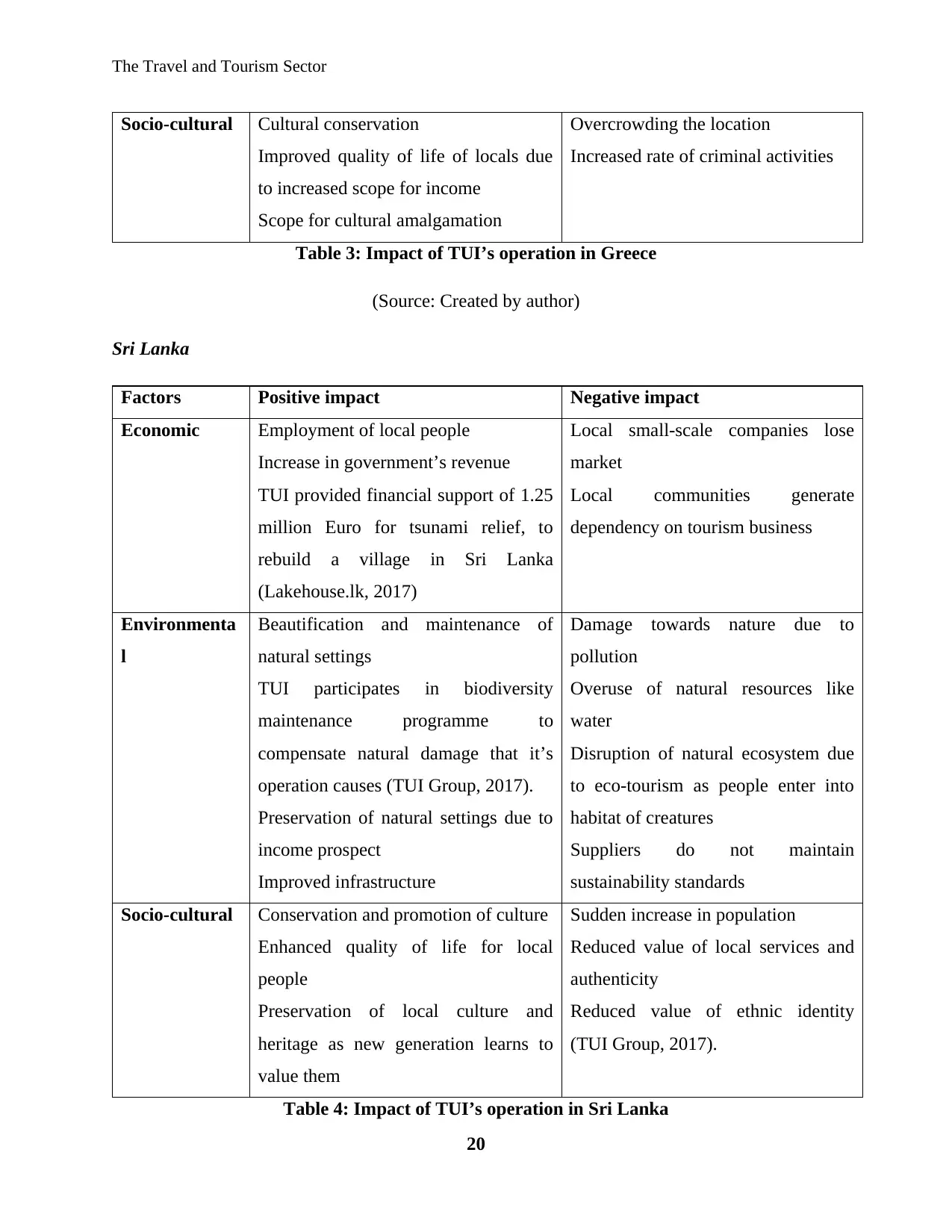
The Travel and Tourism Sector
Socio-cultural Cultural conservation
Improved quality of life of locals due
to increased scope for income
Scope for cultural amalgamation
Overcrowding the location
Increased rate of criminal activities
Table 3: Impact of TUI’s operation in Greece
(Source: Created by author)
Sri Lanka
Factors Positive impact Negative impact
Economic Employment of local people
Increase in government’s revenue
TUI provided financial support of 1.25
million Euro for tsunami relief, to
rebuild a village in Sri Lanka
(Lakehouse.lk, 2017)
Local small-scale companies lose
market
Local communities generate
dependency on tourism business
Environmenta
l
Beautification and maintenance of
natural settings
TUI participates in biodiversity
maintenance programme to
compensate natural damage that it’s
operation causes (TUI Group, 2017).
Preservation of natural settings due to
income prospect
Improved infrastructure
Damage towards nature due to
pollution
Overuse of natural resources like
water
Disruption of natural ecosystem due
to eco-tourism as people enter into
habitat of creatures
Suppliers do not maintain
sustainability standards
Socio-cultural Conservation and promotion of culture
Enhanced quality of life for local
people
Preservation of local culture and
heritage as new generation learns to
value them
Sudden increase in population
Reduced value of local services and
authenticity
Reduced value of ethnic identity
(TUI Group, 2017).
Table 4: Impact of TUI’s operation in Sri Lanka
20
Socio-cultural Cultural conservation
Improved quality of life of locals due
to increased scope for income
Scope for cultural amalgamation
Overcrowding the location
Increased rate of criminal activities
Table 3: Impact of TUI’s operation in Greece
(Source: Created by author)
Sri Lanka
Factors Positive impact Negative impact
Economic Employment of local people
Increase in government’s revenue
TUI provided financial support of 1.25
million Euro for tsunami relief, to
rebuild a village in Sri Lanka
(Lakehouse.lk, 2017)
Local small-scale companies lose
market
Local communities generate
dependency on tourism business
Environmenta
l
Beautification and maintenance of
natural settings
TUI participates in biodiversity
maintenance programme to
compensate natural damage that it’s
operation causes (TUI Group, 2017).
Preservation of natural settings due to
income prospect
Improved infrastructure
Damage towards nature due to
pollution
Overuse of natural resources like
water
Disruption of natural ecosystem due
to eco-tourism as people enter into
habitat of creatures
Suppliers do not maintain
sustainability standards
Socio-cultural Conservation and promotion of culture
Enhanced quality of life for local
people
Preservation of local culture and
heritage as new generation learns to
value them
Sudden increase in population
Reduced value of local services and
authenticity
Reduced value of ethnic identity
(TUI Group, 2017).
Table 4: Impact of TUI’s operation in Sri Lanka
20
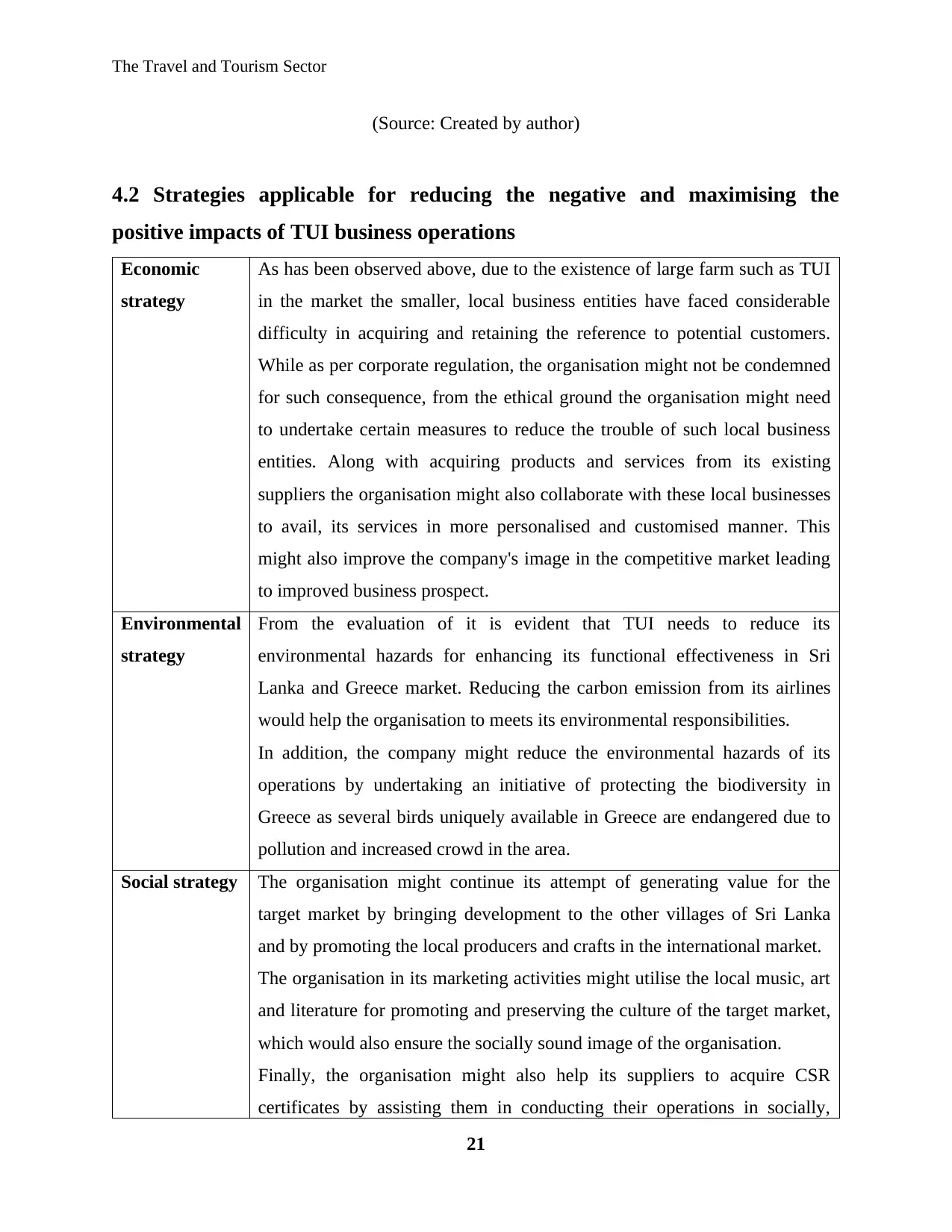
The Travel and Tourism Sector
(Source: Created by author)
4.2 Strategies applicable for reducing the negative and maximising the
positive impacts of TUI business operations
Economic
strategy
As has been observed above, due to the existence of large farm such as TUI
in the market the smaller, local business entities have faced considerable
difficulty in acquiring and retaining the reference to potential customers.
While as per corporate regulation, the organisation might not be condemned
for such consequence, from the ethical ground the organisation might need
to undertake certain measures to reduce the trouble of such local business
entities. Along with acquiring products and services from its existing
suppliers the organisation might also collaborate with these local businesses
to avail, its services in more personalised and customised manner. This
might also improve the company's image in the competitive market leading
to improved business prospect.
Environmental
strategy
From the evaluation of it is evident that TUI needs to reduce its
environmental hazards for enhancing its functional effectiveness in Sri
Lanka and Greece market. Reducing the carbon emission from its airlines
would help the organisation to meets its environmental responsibilities.
In addition, the company might reduce the environmental hazards of its
operations by undertaking an initiative of protecting the biodiversity in
Greece as several birds uniquely available in Greece are endangered due to
pollution and increased crowd in the area.
Social strategy The organisation might continue its attempt of generating value for the
target market by bringing development to the other villages of Sri Lanka
and by promoting the local producers and crafts in the international market.
The organisation in its marketing activities might utilise the local music, art
and literature for promoting and preserving the culture of the target market,
which would also ensure the socially sound image of the organisation.
Finally, the organisation might also help its suppliers to acquire CSR
certificates by assisting them in conducting their operations in socially,
21
(Source: Created by author)
4.2 Strategies applicable for reducing the negative and maximising the
positive impacts of TUI business operations
Economic
strategy
As has been observed above, due to the existence of large farm such as TUI
in the market the smaller, local business entities have faced considerable
difficulty in acquiring and retaining the reference to potential customers.
While as per corporate regulation, the organisation might not be condemned
for such consequence, from the ethical ground the organisation might need
to undertake certain measures to reduce the trouble of such local business
entities. Along with acquiring products and services from its existing
suppliers the organisation might also collaborate with these local businesses
to avail, its services in more personalised and customised manner. This
might also improve the company's image in the competitive market leading
to improved business prospect.
Environmental
strategy
From the evaluation of it is evident that TUI needs to reduce its
environmental hazards for enhancing its functional effectiveness in Sri
Lanka and Greece market. Reducing the carbon emission from its airlines
would help the organisation to meets its environmental responsibilities.
In addition, the company might reduce the environmental hazards of its
operations by undertaking an initiative of protecting the biodiversity in
Greece as several birds uniquely available in Greece are endangered due to
pollution and increased crowd in the area.
Social strategy The organisation might continue its attempt of generating value for the
target market by bringing development to the other villages of Sri Lanka
and by promoting the local producers and crafts in the international market.
The organisation in its marketing activities might utilise the local music, art
and literature for promoting and preserving the culture of the target market,
which would also ensure the socially sound image of the organisation.
Finally, the organisation might also help its suppliers to acquire CSR
certificates by assisting them in conducting their operations in socially,
21
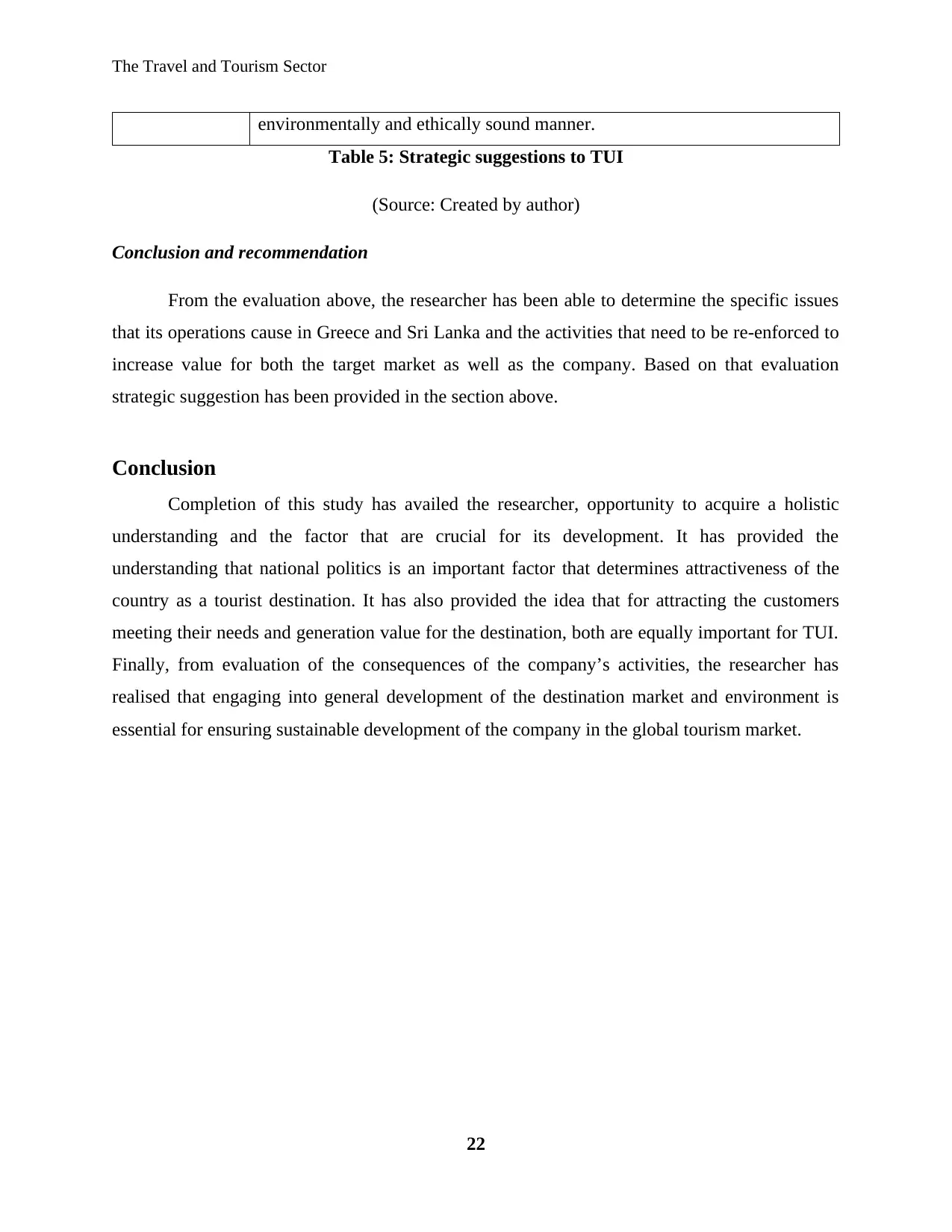
The Travel and Tourism Sector
environmentally and ethically sound manner.
Table 5: Strategic suggestions to TUI
(Source: Created by author)
Conclusion and recommendation
From the evaluation above, the researcher has been able to determine the specific issues
that its operations cause in Greece and Sri Lanka and the activities that need to be re-enforced to
increase value for both the target market as well as the company. Based on that evaluation
strategic suggestion has been provided in the section above.
Conclusion
Completion of this study has availed the researcher, opportunity to acquire a holistic
understanding and the factor that are crucial for its development. It has provided the
understanding that national politics is an important factor that determines attractiveness of the
country as a tourist destination. It has also provided the idea that for attracting the customers
meeting their needs and generation value for the destination, both are equally important for TUI.
Finally, from evaluation of the consequences of the company’s activities, the researcher has
realised that engaging into general development of the destination market and environment is
essential for ensuring sustainable development of the company in the global tourism market.
22
environmentally and ethically sound manner.
Table 5: Strategic suggestions to TUI
(Source: Created by author)
Conclusion and recommendation
From the evaluation above, the researcher has been able to determine the specific issues
that its operations cause in Greece and Sri Lanka and the activities that need to be re-enforced to
increase value for both the target market as well as the company. Based on that evaluation
strategic suggestion has been provided in the section above.
Conclusion
Completion of this study has availed the researcher, opportunity to acquire a holistic
understanding and the factor that are crucial for its development. It has provided the
understanding that national politics is an important factor that determines attractiveness of the
country as a tourist destination. It has also provided the idea that for attracting the customers
meeting their needs and generation value for the destination, both are equally important for TUI.
Finally, from evaluation of the consequences of the company’s activities, the researcher has
realised that engaging into general development of the destination market and environment is
essential for ensuring sustainable development of the company in the global tourism market.
22
Secure Best Marks with AI Grader
Need help grading? Try our AI Grader for instant feedback on your assignments.
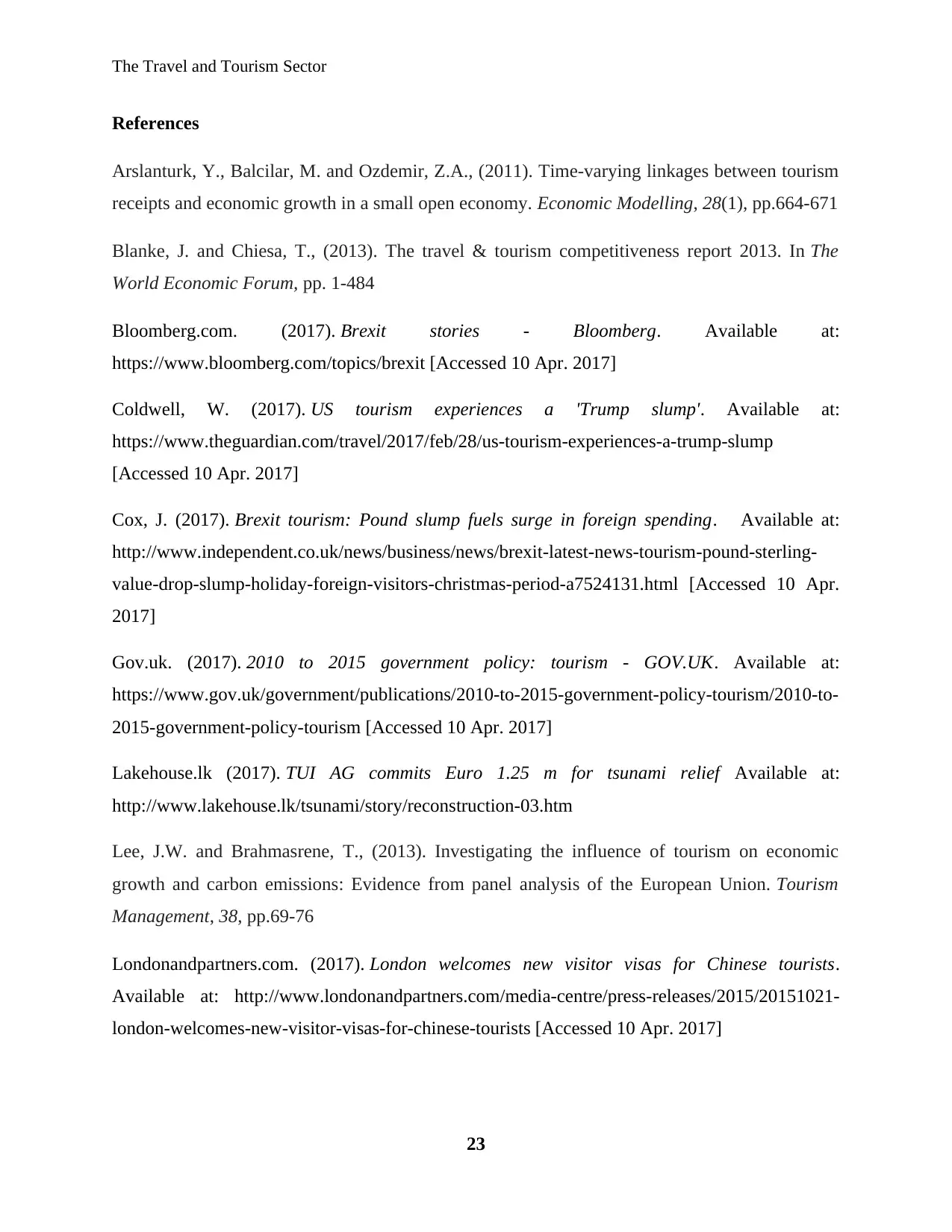
The Travel and Tourism Sector
References
Arslanturk, Y., Balcilar, M. and Ozdemir, Z.A., (2011). Time-varying linkages between tourism
receipts and economic growth in a small open economy. Economic Modelling, 28(1), pp.664-671
Blanke, J. and Chiesa, T., (2013). The travel & tourism competitiveness report 2013. In The
World Economic Forum, pp. 1-484
Bloomberg.com. (2017). Brexit stories - Bloomberg. Available at:
https://www.bloomberg.com/topics/brexit [Accessed 10 Apr. 2017]
Coldwell, W. (2017). US tourism experiences a 'Trump slump'. Available at:
https://www.theguardian.com/travel/2017/feb/28/us-tourism-experiences-a-trump-slump
[Accessed 10 Apr. 2017]
Cox, J. (2017). Brexit tourism: Pound slump fuels surge in foreign spending. Available at:
http://www.independent.co.uk/news/business/news/brexit-latest-news-tourism-pound-sterling-
value-drop-slump-holiday-foreign-visitors-christmas-period-a7524131.html [Accessed 10 Apr.
2017]
Gov.uk. (2017). 2010 to 2015 government policy: tourism - GOV.UK. Available at:
https://www.gov.uk/government/publications/2010-to-2015-government-policy-tourism/2010-to-
2015-government-policy-tourism [Accessed 10 Apr. 2017]
Lakehouse.lk (2017). TUI AG commits Euro 1.25 m for tsunami relief Available at:
http://www.lakehouse.lk/tsunami/story/reconstruction-03.htm
Lee, J.W. and Brahmasrene, T., (2013). Investigating the influence of tourism on economic
growth and carbon emissions: Evidence from panel analysis of the European Union. Tourism
Management, 38, pp.69-76
Londonandpartners.com. (2017). London welcomes new visitor visas for Chinese tourists.
Available at: http://www.londonandpartners.com/media-centre/press-releases/2015/20151021-
london-welcomes-new-visitor-visas-for-chinese-tourists [Accessed 10 Apr. 2017]
23
References
Arslanturk, Y., Balcilar, M. and Ozdemir, Z.A., (2011). Time-varying linkages between tourism
receipts and economic growth in a small open economy. Economic Modelling, 28(1), pp.664-671
Blanke, J. and Chiesa, T., (2013). The travel & tourism competitiveness report 2013. In The
World Economic Forum, pp. 1-484
Bloomberg.com. (2017). Brexit stories - Bloomberg. Available at:
https://www.bloomberg.com/topics/brexit [Accessed 10 Apr. 2017]
Coldwell, W. (2017). US tourism experiences a 'Trump slump'. Available at:
https://www.theguardian.com/travel/2017/feb/28/us-tourism-experiences-a-trump-slump
[Accessed 10 Apr. 2017]
Cox, J. (2017). Brexit tourism: Pound slump fuels surge in foreign spending. Available at:
http://www.independent.co.uk/news/business/news/brexit-latest-news-tourism-pound-sterling-
value-drop-slump-holiday-foreign-visitors-christmas-period-a7524131.html [Accessed 10 Apr.
2017]
Gov.uk. (2017). 2010 to 2015 government policy: tourism - GOV.UK. Available at:
https://www.gov.uk/government/publications/2010-to-2015-government-policy-tourism/2010-to-
2015-government-policy-tourism [Accessed 10 Apr. 2017]
Lakehouse.lk (2017). TUI AG commits Euro 1.25 m for tsunami relief Available at:
http://www.lakehouse.lk/tsunami/story/reconstruction-03.htm
Lee, J.W. and Brahmasrene, T., (2013). Investigating the influence of tourism on economic
growth and carbon emissions: Evidence from panel analysis of the European Union. Tourism
Management, 38, pp.69-76
Londonandpartners.com. (2017). London welcomes new visitor visas for Chinese tourists.
Available at: http://www.londonandpartners.com/media-centre/press-releases/2015/20151021-
london-welcomes-new-visitor-visas-for-chinese-tourists [Accessed 10 Apr. 2017]
23
1 out of 23
Related Documents
Your All-in-One AI-Powered Toolkit for Academic Success.
+13062052269
info@desklib.com
Available 24*7 on WhatsApp / Email
![[object Object]](/_next/static/media/star-bottom.7253800d.svg)
Unlock your academic potential
© 2024 | Zucol Services PVT LTD | All rights reserved.




